#October 28 1994
Explore tagged Tumblr posts
Text




Jeff Buckley signed JSA COA 8x10 cardstock RARE psa bas
Item description from the seller
Certified Authentic by JSA Full Letter of Authenticity as pictured above.
Jeff Buckley signed 8x10 picture on a heavier cardstock paper. This is not a typical matte or glossy type photo but instead a picture on heavier cardstock. Looks fantastic. This was signed by Jeff on October 28, 1994 in Toronto, Canada at Trinity Saint Paul’s Centre.
Very Rare.
#jeff buckley#jeffbuckley#signed JSA COA 8x10 cardstock#rare#autograph#for sale#tornonto canada#saint pauls centre#October 28 1994#1994#October
11 notes
·
View notes
Text

1. Haifa Massacre 1937
2. Jerusalem Massacre 1937
3. Haifa Massacre 1938
4. Balad al-Sheikh Massacre 1939
5. Haifa Massacre 1939
6. Haifa Massacre 1947
7. Abbasiya Massacre 1947
8. Al-Khisas Massacre 1947
9. Bab al-Amud Massacre 1947
10. Jerusalem Massacre 1947
11. Sheikh Bureik Massacre 1947
12. Jaffa Massacre 1948
13. Deir Yassin Massacre 1948
14. Tantura Massacre 1948
15. Qibya Massacre 1953
16. Khan Yunis Massacre 1956
17. Jerusalem Massacre 1967
18. Sabra and Shatila Massacre 1982
19. Al-Aqsa Massacre 1990
20. Ibrahimi Mosque Massacre 1994
21. Jenin Refugee Camp April 2002
22.
23. Gaza Massacre 2012
24. Gaza Massacre 2014
25. Gaza Massacre 2018-19
26. Gaza Massacre 2021
27. Gaza Genocide 2023 is still ongoing.
28. DON'T LET ANYONE CONVINCE YOU THAT IT STARTED ON OCTOBER 7th***
#mustshare#sharethis#must watch#pray for palestine#free palestine#i stand with palestine#end genocide#ceasefire#boycott israel#pray for gaza#like and/or reblog!#pls share#pls reblog#support palestine#famine#show your support#show some love#from the river to the sea palestine will be free#dont stop talking about palestine#gaza genocide#free gaza#gaza strip#free west bank#zionazis#israel are the real terrorists#stop killing children#fuck the idf#fuck netanyahu#satanyahu#fuck biden
824 notes
·
View notes
Text

Hello, dearest companions in the darkness! Have you missed us, because we've been longing and yearning for you these past long months!
Kinktober ♥︎ is right around the corner and for our second edition of the event, we've compiled some sexy vampire-themed prompts just for you. Check out the list of prompts, and the rules and guidelines below.
We can't wait to see you in October ♥︎

Prompts
WEEK 1: PASSION
♡ Day 1: Coffin
♡ Day 2: Mutual Masturbation
♡ Day 3: Clothed Sex
♡ Day 4: Telepathic / Phone
♡ Day 5: Threesome
♡ Day 6: Shower / Bath
WEEK 2: OBSESSION
♡ Day 7: Dirty Talk
♡ Day 8: Hate sex
♡ Day 9: Outdoors / Public
♡ Day 10: Stalking
♡ Day 11: Biting / Marking
♡ Day 12: Touch Starved
♡ Day 13: Edging
WEEK 3: DEVOTION
♡ Day 14: Body Worship
♡ Day 15: Master / Slave
♡ Day 16: Bondage / Restraints
♡ Day 17: Soft And Sweet
♡ Day 18: Aftercare
♡ Day 19: Toys
♡ Day 20: Praise Kink
WEEK 4: FASCINATION
♡ Day 21: Oral Fixation
♡ Day 22: Feeding Kink
♡ Day 23: Mirror Sex
♡ Day 24: Voyeurism
♡ Day 25: Fingers
♡ Day 26: Nipple Play
♡ Day 27: Interspecies / Monsterfucking
WEEK 5: EXPRESSION
♡ Day 28: Lingerie / Striptease
♡ Day 29: Mask / Incognito
♡ Day 30: Leather
♡ Day 31: Costume / Roleplay
Rules and guidelines
This event is 18+ only since it's focused on NSFW content. Not all fills need to be NSFW, but as the perverts that we are, we highly encourage you to get freaky with it.
All adaptations and versions of the characters are welcome; books, comics, the 1994 film, or the AMC TV show. You can specify which in your post if you think it's relevant.
There are 31 prompts, one for each day, but feel free to use multiple prompts per creation or mix and match as you like.
All fan creations are welcome; fanfiction, fanart, fanvids, edits, podfics, whatever you feel inspired to create.
We are firm believers of “don't like don't read”, so be sure to curate your experience if there are any prompts you don't vibe with.
This is a low-pressure event—whether you fill one day or all of them, the aim is to have fun and be creative.
Cross-posting with other events is welcome, just be sure to satisfy the requirements for this event.
You can share your work on any platform you like. If you make a post here on Tumblr or Twitter, tag us and we'll reblog it.
Reblogs are spread throughout the day, so don’t worry if yours isn’t up immediately. But if you think we missed it you can DM us.
In your post please include the following:
Tag with #vfkinktober2024 and/or tag this blog @ vampirefest
Which Day/Prompt you have filled
Any relevant ratings to indicate if the fill is NSFW *Tumblr automatically suppresses any posts with explicit tags so we advise our creators not to tag NSFW if the post itself is not explicit but only links to the explicit version on another site (AO3, Twitter etc.)
Any relevant sensitive tags or trigger warnings—we want to take care of our little community, so please tag appropriately.
You can also add the characters or ship names.
Example of how reblogs will be tagged:
#vfkinktober2024 #day #[prompt being filled] #[type of content; fanart, fanfic etc.] #[trigger warnings that we get from your post] tw #[ship name or pairing]
AO3 Collection
The Vampire Fest AO3 collection will open on October 1st. You can find it here.
We’ll also keep the collection open after October 30th for any late submissions.
How to add your works to the AO3 collection:
Go to [Edit Work] on AO3 and type VFkinktober2024 in the [Post to Collections / Challenges] box that is located below [Summary] and [Notes] and it should pop up in the suggestions.
You can also go to the collection main page and hit the [post to collection] button.
#prompt list 2024#kinktober 2024#iwtv#interview with the vampire#the vampire chronicles#tvc#vc#vampire chronicles#fandom event#writing event#fanart#prompt event#writing prompt#fanfiction#prompt list#anne rice#amc iwtv#iwtv amc#vcsource#vfkinktober2024
311 notes
·
View notes
Text
me when i'm bored and start deducing ace attorney characters' birthdays from the court record and dates of the cases
*assumes if someone (other than the victim) appears in a case their birthday doesn't happen during that case. birthday ranges are given with as few contradictions as possible
canon birthdays for reference: - dustin prince: september 6th 1987 (murdered on his birthday) - rayfa padma khura'in: december 24th 2013, aka almost christmas (birthdate used to open a safe)
deduced birthday ranges:
phoenix is the only character with a non-canon exact birthdate: october 10 1992. he tells maya he's 24 during 1-3 (oct 16-20 2016) and his profile says he's 33 during the 2026 part of 4-4 (oct 7-9 2026). since he ages 9 years but 4-4 is 10 years after 1-3 the only date possible where this can happen without his birthday happening during the case is october 10. this means he's 23 during 1-1 and 1-2 and 35 during 5-4 and 5-5, despite the court record saying he's 34.
miles has the next shortest range: september 1-4 1992. he's 24 during 1-2 (sep 5-9 2016) and 25 during 2-4 (mar 20-23 2018) so the range is march 24-september 4 1992. to have him in the same school year as phoenix i narrowed it down to the first days of september. this means his age during aa5 and 6-dlc is incorrect.
larry's is pretty easy to find out: he ages 1 year between i1-5 and i2-3 so the range is march 18-april 1 1993. this makes his age during 6-dlc incorrect, though.
iirc aa1 states that dl-6 happens when the above three are in fourth grade (2001), but due to their ages they would be in third grade in the us system.
maya is march 24-june 15 1999. she was 18 during aa2 (jun 16 2017-march 23 2018). this means she is 29 during 6-dlc, not 28, and she could have celebrated her birthday with phoenix in khura'in.
pearl is may 18-jun 15 2009. she was 8 during 2-2 (jun 16-22 2017) and 18 during 6-5 (may 16-17 2028). this means she was 18 during 5-dlc, not 17. also i'm not american but i think schools normally graduate in june over there and 5-dlc was in july, so she should have already graduated senior year by then.
i think ema is the only character from the original trilogy whose age didn't get fucked up after the seven year gap, but the downside is her birthday range spans two years: october 10 2000-february 21 2001. she was 16 during 1-5 (feb 22-25 2017) and 25 during 4-4 (oct 7-9 2026).
ok i know ema says she'll be "turning 16 this year" which implies she's 15 during 1-5 but the court record says she's 16. i went with the court record because it creates less problems and doesn't contradict the fact that she's in junior high.
lightning round for everyone else with deduced birthday ranges in one year! a lot of people's birthday ranges span across two years, so these people age a year less than the timeskip between the years suggest (e.g gumshoe ages 1 year between 2-2 and investigations, despite them being 2 years apart)
manfred von karma: september 11-december 23 1951 (49 during i2-3, 60 during i1-4)
marvin grossberg: april 12-september 4 1952 (61 during 3-1, 64 during aa1)
tyrell badd: september 11-december 23 1958 (42 during i2-3, 53 during i1-4, 60 during i1-5)
samson tangaroa: april 3-december 23 1961 (39 or 57 during i2-3)
winston payne: april 21-august 2 1964 (52 during 1-1, 61 during 4-1)
eddie fender: april 9-december 23 1982 (18 during i2-3, 36 during the rest of aai2)
judy bound: april 3-december 23 1984 (16 or 34 during i2-3)
dick gumshoe: may 4-jun 15 1986 (31 during aa2, 32 during aa3 and investigations)
will powers: april 9-october 15 1993 (23 during 1-3, 25 during i2-5)
lotta hart: march 24-april 4 1994 (23 during aa2, 25 during aai2)
adrian andrews: march 24-october 10 1994 (23 during 2-4, 24 during 3-2)
penny nichols: april 9-october 15 1998 (18 during 1-3, 20 during i2-5)
franziska von karma: april 9-june 15 1999 (18 during 2-2, 19 during aai2)
regina berry: april 9-december 27: april 9-december 27 2001 (16 during 2-3, 17 during aai2)
i2-3 was a bit annoying to work with as you can see lol
for myriam, robin and juniper i narrowed down their birthday range due to the fact that they're in senior year:
juniper woods & robin newman: september 1-october 23 2009
myriam scuttlebutt: january 1-august 31 2010
#long post#maybe i'll do this with tgaa when i've played it#*looks at the technical part of literally every fandom i join* mmm give it to me#ace attorney#phoenix wright#miles edgeworth#larry butz#maya fey#pearl fey#ema skye#rip mia apollo athena trucy simon and nahyuta you should have appeared in both trilogies#ace attorney textpost
61 notes
·
View notes
Text
Stargate Anniversary Fest

@melagan and I (@goddess47) are pleased to announce the beginning of the Stargate Anniversary Fest.
You may or may not know that the first episode of Stargate Atlantis (Rising) was first shown on July 16, 2004. Twenty years ago.
AND! October 28, 1994 will be the 30th anniversary of Stargate the original movie.
We're going to celebrate it all! From now until October 31, 2024, we're hoping you join us in celebrating Stargate in all its forms.
The biggest event of the summer is the Anniversary Bingo, but there will be more opportunities for everyone as time goes on. But Bingo takes more time (for the completionist), so we're starting now with the bingo.
Information on the fest, how to get bingo cards and what you might want to do can be found on the AO3 collection page here: https://archiveofourown.org/collections/Stargate_Anniversary_Fest_2024/profile.
You can leave an ask for a pre-made bingo card on the Stargatefests Tumblr (please leave an email address that we will not share with anyone) or at the fest email: [email protected]
Hope you can join in the fun!
159 notes
·
View notes
Text
every broadway christine! :D

Sarah Brightman 1988 principal (January 26, 1988-July 1988) (also 2011 Royal Albert Hall singer)
Patti Cohenour 1988-1989 alternate (January 1988-July 1988) principal (July 1989-June 1989) (also Canada tour 1991) (info)
Dale Kristien 1989-1993 alternate (June 1988-December 1988) (also Los Angeles principal May 1989-August 1993) (info) (la info)
Rebecca Lurker 1988-1991 understudy (1989) principal (Summer 1989-November 1990)
Katherine Buffaloe 1989-1992 alternate (May 1989-May 1992)
Karen Culliver 1990-1998 principal (March 1991-June 1992 or early 1993) (also Chicago tour June 1990-February 1991/Los Angeles 90s/San Francisco tour 1997-1998)
Luann Aronson 1992-1993 alternate (April 1992-November 1993) (also Canada tour) (info)
Brigid Brady 1992 understudy (October 1992)
Raissa Katona 1992 cover (October 1992)
Mary D’Arcy 1989-1993 principal (May 1993) (also Los Angeles 1989-1990/Toronto 1991) (info) (canada info)
Tracy Shayne 1993-1996 principal (November 1993-November 1996)
Laurie Gayle Stephenson alternate (two years in the 90s) (also US Tour) (info)
Teri Bibb 1991-1998 alternate (November 1996) (also US tour 1991-1998) (info)
Adrienne McEwan 1993-2002 alternate (January 1996-December 2002) (also US tour 1993-1996)
Susan Owen 1997-2003 first cover (October 2003) (also US Tour 1997-1998) (info)
Kris Koop 2003-2014 second cover (October 2003-December 2004) (also Madame Firmin July 2011)
Sandra Joseph principal (January 29, 1998-April 15, 2006)
Kimilee Bryant 1994-2012 understudy (May 1, 1994-August 1, 1995) cover (2011) (also Germany 1995-1996/US Tour 1996-1998/Toronto 1999 and Broadway understudy Madame Giry June 28, 2010-July 22, 2012, understudy Carlotta August 9, 2010 - October 18, 2010, Page/Spanish Lady/Princess 2010-July 29, 2012) (info)
Sarah Pfisterer 1991-2000 alternate (1999) principal (2000) (also US Tour principal 1991-1995) (info)
Lisa Vroman 1990-2003 alternate (2001) principal (April-December 2002) (also Los Angeles summer 1992-1993/San Francisco principal 1993-1999/US Tour principal and alternate 2003) (info)
Elizabeth Southard 1997-2006 understudy (1998) (also Vancouver 1997/US Tour alternate 2004-2006) (info)
Julie Hanson 2001-2007 alternate (2003-2004) (also US Tour alternate 2001-2003, 2006-2007) (info)
Rebecca Pitcher 1997-2006 understudy (1997-1999) alternate (July 1st, 2005-April 15, 2006) principal (Apr 17, 2006-July 2007) (US Tour 1999-2004/World Tour 2007) (info) (tour info) (left info) (world info)
Jennifer Hope Wills 2006-2010 alternate (April 20, 2006-December 2006) principal (December 2006-August 2008, June 2009-July 19, 2010) cover (July 26, 2010-September 6, 2010) (info) (dates info) (role change info)
Elizabeth Loyacano 2006-2008 alternate (December 8, 2007-August 2008) (also Vegas 2006) (info) (vegas info)
Marni Raab 2008-present principal (August 2008), alternate (June 2009-March 2014) understudy (October 24, 2016-November 12, 2016) (also Innkeeper's Wife June 2016/Spanish Lady December 2017-February 2018/Page July 2018, April 2019/Madame Firmin December 2022 and Madame Giry in World Tour 2024-2025) (info)
Sara Jean Ford 2007-2017 principal (September 6, 2010-December 3, 2011) alternate (March 10, 2014-June 8, 2014) (also Madame Firmin October 2015-April 2016/Princess July 2017 and US Tour 2007-2008) (info) (tour info)
Trista Moldovan 2008-2012 alternate (December 9, 2011-November 11th, 2012) (also Spanish Lady September 2015, May 2022/Page September 2015/Innkeeper’s Wife March-April 2022/Carlotta April-May 2022/Madame Firmin September 2022/Confidante and Wardrobe Mistress October 2022 and US Tour principal 2008-2010) (info) (roles info)
Elizabeth Welch 2010-2023 understudy (December 5, 2010-March 8, 2023), cover (August 2011) (also US Tour and Oberhausen, Germany) (info)
Samantha Hill 2012-2013 understudy (November 12, 2012-March 3, 2013) alternate (March 4, 2013-July 2013) (info)
Sierra Boggess 2006-2014 principal (January 21, 2013-March 2, 2013, May 12, 2014-September 6, 2014) (also 2006-2007 Vegas principal/2010 Love Never Dies/2011 Royal Albert Hall/almost principal 2016 Paris) (info)
Mary Michael Patterson 2013-2019 alternate (July 29, 2013 - August 25, 2013) principal (August 26, 2013-May 11, 2014) (also LND US Tour principal Meg 2018-2019) (info) (lnd info)
Kaley Ann Voorhees 2015-present (June 22, 2015-October 13, 2019) (also principal World Tour 2019-2020/Masquerade 2025) (info)
Julia Udine 2013-2022 alternate (December 15, 2014-November 6, 2022) (also US Tour 2013-2014) (info) (dates info)
Rachel Zatcoff 2015-2016 alternate (August 31, 2015-January 3, 2016) (info)
Ali Ewoldt 2016-2018 principal (June 13, 2016-November 17, 2018) (info)
Rachel Eskenazi-Gold 2016-2018 alternate (January 4, 2016-June 16, 2018) understudy (July 3, 2017-July 15, 2017) (info)
Eryn LeCroy 2018-2019 understudy (November 19, 2018-June 16, 2019) alternate (June 17, 2019- June 30, 2019) (also Masquerade 2025) (info)
Meghan Picerno 2017-2022 principal (October 16, 2019-January 23, 2022) (also US Tour 2019-2020 and LND Tour 2017-2018) (info) (tour info) (lnd info)
Emillie Kouatchou 2021-2023 alternate (October 16, 2021-January 23, 2022), principal (January 24, 2022-April 16, 2022) (info)
Kanisha Marie Feliciano 2022-2022 alternate (June 27, 2022-March 10, 2023) (info) (half show info)
(list info) (90s christines info) (89-12 dates/understudies info)
@annaskellington
#it's for a possible wiki addition! ;)#this took the whole day! :o#i might've missed some minor ones but i looked hard!#i'm so proud of it! :D#edit: I FORGOT KANISHA NOO :(#she was one of my faves!#it's been 84 years since i heard her name... or seen anything of her!#sorry kanisha! you're in the club now ;)#i'm truly christine crazy now! ;D
23 notes
·
View notes
Note
Hi! A lot has already been written about Robespierre's relationship with both Camille and Saint-Just, but I would be really curious to learn more about his relationship with Pétion that you've mentioned!
Specifically if there is any evidence that we know of that indicates any strong feelings or possible romantic involvement. I'd also be interested to know how their relationship transformed over time, since they ultimately ended up on opposing sides?
Thank you in advance citoyen!

Pétion and Robespierre met for the very first time after the convening of the Estates General in May 1789 to which both had been elected members, Pétion in March, Robespierre in April. Using Oeuvres complètes de Maximilien Robespierre, I’ve tracked the first instance of the two getting mentioned together to May 20 1789, when the journal Le Point du Jour describes a debate on the publication of municipal minutes both have taken part in:
In the debates occasioned by this motion, great talents already known, such as those of MM. Target and Mirabeau fulfilled the expectations one had created. Others, like those of MM. Barnave, Chapelier, Pétion de Villeneuve and Robespierre, manifested themselves in a striking manner.
Using the same source, along with Poursuivre la Révolution : Robespierre et ses amis à la Constituante (1994), it can be observed that Pétion and Robespierre from this moment up until the closing of the National Assembly in September 1791 fought side by side in a number of big discussions — the question of war and peace (May 16-22 1790) where both supported the motion that the Assembly alone should hold the right to declare war and king should be deprived of it, the colonies (May 11-15 1791), where both were among the 27 deputies speaking in favor of free men of color, the organisation of the national guard (27-28 april 1791), a body to which they argued both active and passive citizens should belong, the abolition of lettres de cachet (13-16 March 1790) as well as that of the silver mark and land ownership (August 1791), the non-eligibility of National Assembly deputies to the next Legislature (May 16 1791) an idea Robespierre himself had come up with, and the question of the death penalty (May 30 1791), were both were among the rare ones to ask for its complete and total abolition. Pétion and Robespierre are found agreeing on a multitude of smaller topics as well, such as the sanction of the Declaration of the Rights of Man (October 2 1789), the treatment of bishops in office (June 22 1790), the inviolability of deputies (June 25 1790), the massacres of La Glacière (16-18 November 1790), police functions (December 28 and December 30 1790), the power of the colonial committee (January 11 1791) the organisation of the justice system (February 5 1791), the organization of administrative bodies (March 3 1791), an extradition request from the court of Vienna (March 5 1791), appointment of national treasury administrators (March 9 1791), the judgment of disputes in electoral matters (March 13 1791), the right to inheritance (April 1 1791) and the right to petition (May 9 and May 10 1791).
All these shared battles of course led to the two often getting mentioned side by side in the evergrowing press. Over the first two years of the National Assembly’s existence, these mentions mostly just consist of Pétion and Robespierre both getting listed as two of several deputies of the far left, alongside people such as Mirabeau, Barnave, Lameth, Duport, Buzot, and Grégoire. The first instance of someone describing Pétion and Robespierre as a unit while also seperating them from their fellow radical deputies that I’ve found is from December 13 1790, when Desmoulins writes the following in number 55 of his Révolutions de France et de Brabant:
One cannot speak about Robespierre without thinking about Péthion [sic].
This tying together of the two deputies and their cause was in the following months to do nothing but grow among the journalists. Desmoulins himself would go on to declare that ”it is only Péthion and Robespierre that I have constantly praised, because every man of good faith will agree that they have always been irreproachable” (number 69, March 21 1791) and that ”we must always come back […] to the system of Robespierre and Péthion: perish the colonies, rather than the principles!” (number 77, May 16 1791). In number 472 (May 28 1791) of of l’Ami du Peuple, Marat describes the National Assembly as consisting of ”two hundred men too narrow-minded to know what they are, and one or two honest men who have never wanted anything other than the general good. Such are Péthion [sic] and especially Robespierre,” and three days later, in number 475, he reveals that ”If I were tribune of the people […] I would give Péthion [sic] and especially Robespierre a civic crown.” In number 783(October 2 1791) of Le Patriote Français, Brissot called Pétion and Robespierre ”the two Catos of the Constituent” and a few days later Louis Marie Prudhomme expressed himself in similar terms, writing ”Péthion [sic], Robespierre and the small group of their like, did not fail to embarrass their adversaries so powerful in number and means: more than once their presence reminded that of Cato to the licentious spectators of Rome” (Révolutions de Paris, number 117).
The image of the two as inseparable was even stronger in the different Jacobin clubs scattered across the land. On April 17 1791 it was discovered that one of them had placed busts of Pétion and Robespierre next to that of the recently deceased Mirabeau, contrary to the rule that no busts of living people would be displayed in the clubs. On July 13 1791, one M. Sigaud read a letter to the parisian Jacobin club signed by 300 people wanting to ”give thanks to MM. Pétion and Robespierre, for having announced the greatest courage in the defense of the people. They will threaten you with daggers, with death: fear nothing, their daggers will only be able to penetrate you through the rampart of our bodies. Our arms, our hearts, our lives, everything is yours.” Two weeks after that, July 25 1791 Tallien exclaimed to the same club that ”Where Pétion and Robespierre are, are the true friends of the Constitution,” and three months later, October 10 1791, he held a speech where he said that ”the names of Pétion, of Robespierre, and of of those who, like them, have well served their fatherland, must be the rallying sign of all patriots; we always see them on the path of honor, and, by following in their footsteps, we are sure not to go astray.” On April 30 1792, Simond told the jacobins that ”MM Pétion and Robespierre” were the best revolutionaires, ”because there are no individuals who have figured like them in our revolutionary splendors.” In Nouveau Tableau de Paris (1797), Louis Sebastien Mercier remembered how Pétion had been the ”inseparable friend of Robespierre, their principles were then so consistent and their intimacy so marked, that they were called the two fingers of the hand. They continued to be placed under the same accolade until the end of 1792,” while Robespierre’s sister Charlotte wrote in her memoirs (1834) that her brother during the National Assembly ”was closest with Pétion, whose popularity then equaled his. They […] fought for the cause of the people, like two generous imitators who looked to surpass each other in noble sentiments.”
In spite of all this, it’s not until December 1790 I’ve been able to for the first time find Pétion and Robespierre together with a backdrop that’s not political, as they on the 25th and 27th of that month signed the wedding contract and attended the wedding ceremony of Camille and Lucile Desmoulins, Camille reporting to his father that ”I had as witnesses Péthion [sic] and Robespierre, the elite of the National Assembly, Sillery, who wanted to be there, and my two colleagues Brissot de Warwille and Mercier, the elite among the journalists. […] The dinner was at my house, only M. and Mdm Duplessis, their daughter Adèle, the witnesses and the celebrant.” Two months later, March 3 1791, Sillery writes to the same Camille that ”Madame de Sillery is coming to dine at my house with Pétion and Robespierre, I dare to ask your lovable and beautiful wife to do me this honor as well.” Yet another month later, April 3 1791, Robespierre made the motion that the recently deceased Mirabeau be buried in the Panthéon. In his memoirs (written 1793), Brissot claimed that ”Pétion reproached [Robespierre] for it the same day, he reproached him for it in my presence.” According to number 72 of Révolutions de France et de Brabant, Pétion was indeed the only deputy that didn’t attend Mirabeau’s funeral on April 5 1791. Finally, in 1850, Louis Philippe told John Wilson Croker that he at some point during the National Assembly had been at a dinner where the two deputies where — ”Pétion was big and fat, good-humoured and talkative, but heavy withal. He talked on, Robespierre said not a word, and I took little notice of him, he looked like a cat lapping vinegar. Pétion was rallying him on being so taciturn and farouche, and said they must find him a wife to apprivoiser him: upon which Robespierre opened his mouth for the first and last time with a kind of scream, ”I will never marry!” (The Croker Papers: the Correspondence and Diaries of the late right honourable John Wilson Croker… (1885) volume 3, page 209).
On June 10 1791, Robespierre was elected to become the future public prosecutor of the Paris criminal tribunal. Three days later, Pétion was chosen as president of the same body, after the first three elected deputies had all resigned. These new posts are the subject of the very first conserved letter exchanged between the two, dated 15 June 1791. Pétion writes the following to Robespierre using vouvoiement, the form the two are always recorded to have used with one another:
You probably know, my friend, about my appointment. I accept. I don't count having you as a colleague as something small. What scared Duport away is what attracts me. I looked for you in the hall and didn't see you. I wanted to go to your house, but I said to myself: I won't find him, he never dines at home. Buzot is a substitute and accepts. Be well, all yours. This Wednesday evening. Pétion.
There’s also the following letter from Pétion to Robespierre, that it too has to do with the latter’s position as public prosecutor. It is unfortunately undated, but Correspondance inédite de Maximilien et Augustin Robespierre (1910) traces it to June 1791 as well:
My friend, I violate the decrees, I become solicitor. It is true that my offense is not within the competence of the assembly. I ask you in the name of my relative, my friend and my host the right to supply medicine to the poor sick prisoners. I was told that this concession was within your competence. I don’t know anything about it. All yours. This Friday evening.
Just six days after Pétion had penned the first letter down, June 21, Paris woke up to the discovery that the royal family had fled the capital during the night. In number 82 of Révolutions de France et de Brabant, Desmoulins described how he and others the very same day had brought a woman with information to give about the escape to the Jacobin Club, in the hopes that her testimony would get Robespierre to denounce Lafayette and Bailly. At first, Robespierre seems quite willing to go through with this, but when Pétion shows up and shows his disapproval of the idea he is quickly taken aback:
The section immediately named a deputation of 12 members, and we took this woman to the National Assembly. Robespierre and Buzot, whom we consulted, were carried away by the assured countenance of the witness, and by the whole of the testimony; but they were greatly perplexed as to the measures to be taken. All the members of the assembly were against revolutionaries, some without knowing it, but many knowingly, and the others out of fear. We will be, they said, pushed back from the tribune, referred to the research committee, and our accusation will be entered in this mortuary register of denunciations. Péthion [sic] came, and increased the embarrassment, and stopped Robespierre, who, at first, was quite disposed to take away the reputation of Bailly and La Fayette by assault.
In her memoirs, Madame Roland claimed to the very same day have seen Brissot and Robespierre at Pétion’s house (on rue du Faubourg-Saint-Honoré n. 6, today roughly a one hour walk from Robespierre’s apartment on rue de Saintonge 30) discussing the flight:
I was struck by the terror with which [Robespierre] seemed to be overcome on the day of the king's flight to Varennes; I found him in the afternoon at Pétion’s; where he said with concern that the royal family would not have taken this course without having a coalition in Paris which would order the Saint-Barthélemy of the patriots, and that he expected to be dead within twenty-four hours. Pétion and Brissot said, on the contrary, that the flight of the king was his loss, and that it was necessary to take advantage of it; that the dispositions of the people were excellent; that it would be better enlightened on the perfidy of the court by this approach than it would have been by the wisest of writings; that it was obvious to everyone, by this fact alone, that the king did not want the constitution he had sworn to; that it was time to ensure a more homogeneous one, and that it was necessary to prepare minds for the Republic. Robespierre, sneering as usual and biting his nails, asked what a Republic was!
In the night between June 21 and 22 the royal family was stopped in Varennes, and the next day Pétion, alongside Barnave and Maubourg, left the capital to escort them back. They reached Paris again on June 25. The escape attempt resulted in massive discontentment and demands that the king abdicate. On July 15, a petition written by a certain Massoulard, asking the assembly to suspend “all determination on the fate of Louis XVI until the well-pronounced wish of the entire Empire has been expressed” was brought to the National Assembly. In Lettre de J. Pétion à ses Commettans sur les Circonstances Actuelles, released later the same month, Pétion described how he and Robespierre had held these petitioners off, saying that since the Assembly had voted to keep the king on the throne the very same day, a petition was out of order:
I will say, since the occasion presents itself, that only once in this affair was a relationship established between the citizens gathered on the 15th of this month at the Champ-de-Mars and myself. These citizens had drawn up a petition for the National Assembly; commissioners carried them; they were charged with speaking to those who had risen against the project of the committees, to Grégoire, Robespierre, Prieur and myself, to be their organs with the assembly, and to negotiate their entry to the bar. M. Robespierre and I left the room to listen to these commissioners; and we told them that this petition was useless, that the decree [to keep the king on the throne] had just been passed. They asked us for a word to see that they had fulfilled their mission; we wrote a letter which breathes the love of order, of peace, and which, I believe, has been able to prevent misfortunes.
When Pétion, Robespierre and Rœderer entered the Jacobin club’s evening session the very same day they got covered in applause. Both were there again on both July 16, putting their signatures on a letter to the sister societies in the provinces about liberty of the press and the elections for the upcoming Legislative Assembly, as well as on July 17 and 18, this time dealing with the mass walkout (that left the two and a handful more as the only National Assembly deputies still members of the Jacobins) following the founding of the Feuillants club the previous day. Desmoulins, who was also present at the session on the 17th, stated that he didn’t want any writing to say the Jacobins were splitting from the National Assembly since, ”certainly, where MM. Robespierre and Pétion are, there is no split with the National Assembly.”
Pétion would later recall how afraid Robespierre had been during these days. In J. P. Brissot, député à la Convention nationale, à tous les républicains de France; sur la société des Jacobins de Paris (1792) Brissot even accused Robespierre of having ”secretly proposed fleeing to Marseille to Pétion.” If that is a charge that should be taken with a grain of salt, it was nevertheless during these same days Robespierre changed address and took cover with the Duplay family on Rue Saint-Honoré 366. In her old days, the family’s youngest daughter Élisabeth claimed Pétion would frequent the house ”in the early days.” The year after the move Robespierre himself would nevertheless write that it wasn’t until August 7 1792 Pétion for the first time set his foot in the house (see below).
On September 30 1791, the National Assembly was finally closed to be replaced by the Legislative Assembly. Several journals described the triumphant exit Pétion and Robespierre made from there the very same day, getting met by cheers, applauds and cries of joy from a huge crowd who offered them so called ”civic crowns,” before the two climbed into a carriage (a ”humble” one according to Révolutions de France et de Brabant) and rode off together to the sound of fanfares. Here is the description given by Le Thermomètre du Jour:
Pétion and Robespierre came out last, arm in arm. Citizens with oak crowns tied with tricolor ribbons in their hands embraced them and said to them: ”Receive the price of your good citizenship and your incorruptibility; we give, by crowning you, the signal to posterity”; and the applause, the bravos, the shouts of ”long live Pétion and Robespierre! Long live the spotless deputies!” mingled with the chords of military music placed on the terrace of the foliage, filled all hearts with the sweetest intoxication. In vain, the two legislators wanted to hide from these testimonies of public recognition: as they fled, a young lady whom they met on the stairs which lead to the storage room said to them: ”allow at least that my child embraces you”; and this they could not resist. To escape the chorus of applause who were pursuing them, the two deputies, who had taken refuge in a house in the rue Saint-Honoré, got into a carriage. Immediately, in the delirium of enthusiasm, the horses were unhitched, and a thousand biases hastened to drag the carriage; degrading idolatry, of which those who were the object of it were afflicted and indignant. At this moment the honorable Robespierre, seized with holy indignation, hastily alighted from the carriage. “Citizens, he said, what are you doing? What humiliating posture will you take? Is this the price of my work for you for two years? Don't you already remember that you are a free people?” And he quickly got back into the carriage where his worthy colleague was. The attitude and admiration of the citizens at this moment cannot be described: sublime spectacle! You make delicious tears flow. One let the carriage roll off to the sound of fanfares, applause, cries and the most energetic blessings. May those who could have deserved such a triumph dry up in spite, comparing this excess of gratitude to the silence of contempt, or to the curses of hatred who accompanied them. Above all, may this touching example produce Pétions and Robespierres in the new legislation.
This celebration might very well have been the follow-up of an intervention made at the Jacobin club on September 25 by one Varnet, who asked for ”a civic feast rewarded by the grateful parties to MM. Robespierre, Péthion [sic], etc, much more fraternal than all these royal celebrations which recall the ancient idolatry of the Badauds.” These would not be the homages paid to the two in the wake of the closing of the National Assembly. On October 9, the Jacobin club of Strasbourg decided to send each of the two a civic crown, as revealed in a letter with 400 signatures published in number 231 of Mercure Universel (October 17 1791). On November 6 1791, Annales patriotiques et littéraires could reveal that the club of Saint-Laron ”has informed that of Paris of the tribute of homage which it has paid to Pétion to Robespierre, and of the annual festival which it established in their honor, to teach, it said, to children that a glance from the people is better than the caresses of kings,” on October 27 the club in l’Orient reported (in a letter published in number 123 of Révolutions de Paris) that ”the names of Robespierre and Péthion [sic] are in veneration among [its members],” and on October 18 the club of Lyon sent Pétion and Robespierre an open letter thanking the two for all their services.
Shortly after the closing of the National Assembly Pétion left for London, but not before he was able to hand a report written by him on patriotic societies to Robespierre, which the latter then read to the jacobins on October 5. When Robespierre too left the capital for Arras a few days later, Pétion’s shadow clearly accompanied him. In a letter to Maurice Duplay dated October 16 he could joyfully report the following:
At Arras itself, the people received me with demonstrations of affection which I cannot describe, and the thought of which still warms my heart. Every possible means was used to express it. A crowd of citizens had come out of town to meet me. They offered a civic crown, not only to me, but to Pétion as well, and in their cheers the name of my friend and companion in arms was often mingled with my own.
A month later, November 17, Robespierre writes to Maurice again:
…I think with sweet satisfaction about the fact that my dear Pétion may have been appointed mayor of Paris as I write. I will feel more keenly than anyone the joy that every citizen should be given by this triumph of patriotism and frank honesty over intrigue and tyranny.
Robespierre came back to Paris on November 28. One of the first things he did was go and dine at the house of Pétion (who he here goes so far as to call his family), as revealed by a letter to Antoine Buissart he wrote two days later:
With what joy we met again! With what delight we embraced! Pétion occupies the superb house inhabited by the Crosnes, the Lenoirs: but his soul is always simple and pure: the choice of him [as mayor] alone would suffice to prove the revolution. The burden with which he is charged is immense; but I have no doubt that the love of the people and its versus gives him the necessary means to carry it. I'm having dinner at his house tonight. These are the only times when we can see each other as a family, and talk freely.
Following Pétion’s election to mayor, his apperances in public become much fewer compared to his time as deputy of the National Assembly. Robespierre on the other hand could not get enough of praising his friend at the Jacobin club. On February 10 1792, he held a speech in which he cried out the following, apropos of suggesting holding a ceremony at the Champ-de-Mars and making a sacrifice on the altar of liberty:
O Pétion! You are worthy of this honor, worthy of deploying as much energy as wisdom in the dangers that menace the fatherland that we have defended together. Come, let us mingle our tears and weapons on the tombs of our brothers, remind ourselves of the pleasures of celestial virtue, and die tomorrow, if need be, from the blows of our common enemies.
Five days later, in his inaugural address as public prosecutor, Robespierre called Pétion ”the one of all my colleagues to whom I was most closely bound, by works, by principles, by common perils, as much as by the ties of the most tender of friendships,” and says it was due to Pétion’s advice that he was taken aback from proposing that National Assembly deputies not only be barred from serving on the Legislative Assembly, but also be excluded from any public offices at all following the start of said assembly. He then eulogized his friend once again: ”I swear that it is he who, up until this moment, has saved the capital and prevented the horrible plans of the enemies of our liberty; I swear that the courage and virtues of Pétion were necessary for the salvation of France.” A month after that, March 19, Pétion sent the Jacobins a letter disapproving of the recent usage of the so called ”bonnet rouge” among the club’s members. After the letter had been read out, Robespierre stood up and supported his motion, and together, the two succeded in getting the bonnet rouge depositioned from the Jacobin Club:
I respect, like the mayor of Paris, all that is the image of liberty, I will even add that I saw with a great pleasure this omen of the rebirth of liberty; however; enlightened by the reflections and by the same observations made by M. Pétion, I felt urged to present to society the reasons which have just been offered to you, but as I have only patriotism to fight with, I am charmed to be guided by M. Pétion, by a citizen whose civility and love for liberty is foolproof, by a citizen whose heart is ardent and whose head is cold and thoughtful, and who brings together all the advantages, talents and virtues necessary to serve the country, at a time when the most skillful and astute enemies can deal it disastrous blows.
And yet another month later, April 13 1792, Robespierre defended Pétion against attacks of unnamed enemies:
The mayor of Paris, they say, is ambitious; we are arsonists who slander the constituted authorities to elevate our ambition at the expense of others; well, prove it. Our goal has been to fight in the constituent assembly all the parties of tyranny, Pétion and I have done it, were it even the means Pétion would guarantee, far from foreseeing then that our principles would triumph over a cabal if strong, we believe that after the constituent assembly we would be immolated and that the principles of our ancestors would be adopted: I saw Pétion, at the time when he was brought to the position of Mayor of Paris, two months before his appointment, at a time when we can remember that the votes of the good citizens floated between him and me, I saw the mayor of Paris determined not to accept this place; he read the same feelings in my heart, and when he accepted it, I guarantee to the whole nation that he only did it because he had only considered it as a terrible pitfall for the citizen who would occupy it in such a stormy circumstance for the public good.
Despite Pétion’s massive new workload, he and Robespierre still found the time to see each other, albeit with work still being the main topic of discussion. In Réponse de Maximilien Robespierre à Jêrome Pétion (November 1792), Robespierre recalled that ”Last January to June, when the ministers were renewed, I saw you (Pétion) in the firm belief that it was you who had chosen them. As I asked you if this action of the court was not suspicious to you, you replied, with a very remarkable air of consent: “Oh! if only you knew what I know! If only you knew who nominated them!” I guessed you, and I said to you, laughing at your good faith: “it’s you, perhaps.” And then, rubbing your hands, you responded: “Hem, hem,” No matter how much you persisted in confirming this fact to me, I didn't want to believe it. I esteemed you too much to suppose that you would have the necessary credit with Louis XVI and his courtiers to give him ministers.” Somewhere after Robespierre was sworn in as public prosecutor, the two also co-authored the pamphlet Observations sur la nécessité de la reunion des hommes de bon foi contre les intrigues par Jérome Pétion, Maire de Paris; et Maximilien Robespierre, Accusateur Public du département de Paris.
But all while this ”bromance” was playing out, so too was the debate on whether or not France ought to go to war. It’s most influential voices were Robespierre on the anti-war side, and Pétion’s childhood friend and freshly baked member of the Legislative Assembly Brissot on the pro-war side. Pétion himself would appear to have stayed neutral in the conflict, I have at least not been able to find any instance of him speaking his mind on the topic. But on April 25 1792, five days after France had declared war on Austria, he adressed the following letter to Robespierre, regretting the session at the Jacobins held the same day, during which Brissot’s ally Guadet had loudly denounced Robespierre, calling him an ”imperial speaker […] who constantly puts his pride before public affairs, the position to which he was called”, after which Robespierre had requested time to properly respond, something which he was granted. Pétion does however not attack Guadet for saying what he had said about Robespierre, instead confining himself to lamenting division in general in a time when external war has just been declared:
The session which took place yesterday [sic] at the Jacobins saddened me. Is it possible that we’re tearing ourselves apart like this with our own hands? I don't know what demon thus blows the fire of discord. What! It is when we are at war with the enemies without that we will stir up trouble within. The Society most useful to the progress of the public spirit and of liberty is on the point of being torn apart. We suspect each other, we insult each other, we slander each other, we accuse each other respectively of being traitors and corrupt. Perhaps if the men who present themselves thus were to see themselves in the open they would esteem each other. How hideous human passions are. What, we can't have the calm and energy of free men? We cannot judge objects in cold blood, we scream like children and are furious. I truly tremble when I consider who we are and always wonder if we will retain our freedom. I haven't rested all night, and have only dreamed of misfortunes. A grace, my friend, be aware of the split that is preparing itself. Caution and firmness. I see there men who seem to have the most fervent patriotism and whom I believe to be the most perverse and corrupt men. I see others who are only stunned and inconsequential but who do as much harm by levity as others by combination. Irritated self-esteem, deceived ambitions play the biggest game. When we reach port, must storms arise and the ship run the risk of crashing against the rock? Think about it seriously. Redouble your efforts to get us out of this mess. Be well. Your friend. Pétion.
On April 27 1792, Robespierre could deliver a speech by the name of Réponse de M. Robespierre, aux discours de MM. Brissot & Guadet du 25 avril 1792 in response to what Guadet had said about him two days earlier. In it, he stated among other things that the things the two reproached him for ”are precisely the same charges brought against me and against Péthion [sic] last July by Dandré, Barnave, Duport, La Fayette!” Something which the authors of the journal Chronique de Paris picked up on when recounting the speech:
…Before finishing, [Robespierre] had taken care to name M. Pétion, and to establish between them a community of ideas, a relation of feelings on the objects which divide the society. He knows very well that M. Pétion is far from approving his follies, or rather his fury, but he also knows that he could not disarm him without losing a large part of his popularity, so the goal was not missed, and Robespierre's party was swelled with all the worthy friends of the worthy Pétion.
Two days after that, April 29 1792, Pétion writes yet another letter to Robespierre:
My friend, I will go to the Jacobins tonight and ask to speak. I will not speak of people, but of things. I will set forth principles and I will come to conclusions suitable for restoring peace. The situation of this society is getting worse day by day. After having rendered such important services, when it can render still more important ones, it would be terrible if it gave the scandalous example of a split. The spirits are very irritated. One becomes the fable of all malicious people, the newspapers are tearing this Society apart, tearing its members apart, we must put an end to all writings. Your friend, Pétion.
Pétion did indeed show up to the Jacobins the very same day, where he, according to the minutes, ”made a long motion of order tending to maintain the union in the Society, and asked that all these quarrels be moved on from.” Right after the club had ordered the speech printed, Robespierre tried to take the floor but was refused by ”girondin” president Lasource. The next day, he once again attempted to speak against Brissot and Guadet, underlining that ”I want to keep to the limits fixed by M. Pétion,” but that his approach had been turned against them by ”libelists, directed against him, against me, against this society and against the people itself.” Robespierre again insists on a closeness between him and Pétion:
I know he is horrified of plots hatched against me: his heart has spilled over into mine; he cannot see without shuddering these horrible calumnies which assail me from all sides.
But his thoughts did not gain any approval from the jacobins this day either, and Robespierre instead opted to found a journal — Le Defenseur de la Constution — to attack his enemies from instead. When mayor Pétion and Procureur de la Commune Manuel got temporarily suspended from their duties on July 6 and arrested on July 7, for complicity in the demonstration of June 20, Robespierre used number 9 (July 14 1792) of said journal to defend them (in Réponse de Maximilien Robespierre à Jérôme Pétionhe confidently reminded him that ”no one more than me defended you in a more public and more loyal manner, against all the harassment [the court] brought upon you.”) On July 13, when the suspension of Pétion was lifted, ”M. Robespierre, while applauding [the decree], points out, however, that this should be less a cause for rejoicing as there are reasons for the true friends of liberty to grieve the fact that this decree was postponed for a fortnight.”
In Réponse de Maximilien Robespierre à Jérôme Pétion (November 30 1792), Robespierre reported about the following meeting (that Pétion also confirmed when later responding to him) the two had had, roughly a month after Pétion had been returned to duty, on the topic of popular insurrection:
On August 7, I saw the mayor of Paris enter my house; it was the first time that I received this honor, although I had been closely connected with you. I conclude that a great motive brings you; you talk to me for a whole hour about the dangers of insurrection. I had no particular influence on the events; but as I quite often frequented the Society of the Friends of the Constitution, where the members of the directory of the federates habitually went, you urged me earnestly to preach your doctrine in that society. You told me that it was necessary to defer resistance to oppression until the National Assembly had pronounced the deposition of the King; but that it was necessary at the same time to leave him the leisure to discuss this great question with all possible slowness. You could not, however, be sure that the court would adjourn the project of slitting our throats for as long as it pleased the National Assembly to adjourn the forfeiture; and everyone knew that the royalist party was then dominant in the Legislative Assembly; and your Brissot and his friends had delivered long speeches on this question, the sole object of which was to prove that it was necessary to retreat from it, and ceaselessly to postpone the decision. You even know what public disfavor their equivocal conduct had incurred; they saw in it only the project of frightening the court by the fear of an insurrection, in order to force it to take back ministers of their choice. I could have made these comparisons myself; but such was still my confidence in you, and, if it must be said, the feelings of friendship which your unexpected step aroused in my heart, that I believed you up to a certain point; but the people and the federals did not.
Two days later, the insurrection of August 10 took place. Pétion’s behavior during this night would become a big subject of quarrel between him and Robespierre in the months to come. Two days after the insurrection, August 12, Robespierre begun to serve at the so-called Insurrectional Commune. The power struggle between this body and the Legislative Assembly would it too serve as cause for conflict between the two. Already on Robespierre’s second day at the commune,��August 13, Pétion and Manuel came there, having just escorted the royal family to their new prison in the Temple. Giving an account over this mission, the two stated that the place ”did not seem suitably arranged,” and that the king should be kept somewhere else instead. Later during the session, Robespierre claims (I can’t find this recorded in the session’s actual minutes) that Pétion presented a report from the Legislative Assembly to within 24 hours dissolve the commune and replace it by the old municipality, a proposal which got rejected. He would later reproach Pétion for both of these things.
According to J.M Thompson’s Robespierre (1935), on August 17 Robespierre was commissioned by the commune to interview Pétion to get him to co-operate (I can’t find this in the commune’s minutes either). The interview did however not go that well, resulting in the following letter from Pétion to Robespierre, written on August 20:
You know, my friend, what my feelings are for you, you know that I am not your rival, you know that I have always given you proofs of devotion and friendship. It would be useless to try to divide us, you would have to stop loving liberty in order for me to stop loving you. I have always found more fault with you to your face than behind your back. When I think you too ready to take offence, or when I believe, rightly or wrongly, that you are mistaken about a line of action, I tell you so. You also reproach me for being too trustful. You may be right; but you must not assume too readily that many of my acquaintances are your enemies. People can disagree on a number of unessential points without becoming enemies; and your heart is said to be in the right place. Besides, it is childish to take offence over the things people say against one. Imagine, my friend, the number of people who utter all lands of libels against the mayor of Paris! Imagine how many of them I know to have spread damaging reports about me! Yet it doesn’t worry me, I can assure you. If I am not totally indifferent to what others think about me, at least I value my own opinion more highly. No… you and I are never likely to take opposite sides: we shall always hold the same political faith. I need not assure you that it is impossible for me to join in any movement against you: my tastes, my character and my principles all forbid it. I don’t believe that you covet my position any more than I covet that of the king. But if, when my term of office comes to an end, the people were to offer you the mayoralty, I suppose that you would accept it; whereas in all good conscience I could never accept the crown. Look after yourself, let us march forward, we are in a situation threatening enough to force us to think only of the public good.
As can be seen, Pétion was still trying to salvage the relationship that had begun to deteriorate already in the spring, an effort that Robespierre seemed to share. If we’re to believe Buzot’s memoirs, written in 1793, Robespierre had suggested making ”a solemn declaration on the events which preceded the revolution of the 10th of August” to Pétion, who in his turn ”was willing to lend himself to it, for he had a kind of inexcusable weakness for Robespierre.” But when Robespierre came forward with the finished declaration that, according to Buzot, contained ”a lot of baseness and sweet talk [sic] for Louis XVI,”Pétion did however refuse to sign it, and Robespierre was forced to rework it. In an address from the representatives of the Paris commune to their fellow citizens dated September 1, Robespierre and his colleages also underlined that ”the principal artifice which our enemies employed to destroy us, was to oppose to the assembly of the representatives of the commune the names of Manuel and Pétion, and to claim that our existence is an attack against the authority in which these two magistrates were clothed.” But the relationship was well under way to break down, and the first days of September 1792 would be filled with conflicts between the two, in relation to the so called ”September massacres.” This time it would instead be Pétion who got appalled over Robespierre’s conduct.
Again on September 1, one day before the massacres, Robespierre held a speech to the same Paris Commune opposing the idea of opening the city’s barriers, that, in Pétion’s own words, ”saddened my soul.” […] [Robespierre] gave himself up to extremely animated declamations, to the lapses of a gloomy imagination; he perceived precipices under his feet, liberticidal plots; he pointed out pretended conspirators; he addressed himself to the people, excited the spirits, and occasioned, among those who heard him, the liveliest fermentation. I replied to this speech, to restore calm, to dissipate these black illusions, and to bring the discussion back to the only point which should occupy the assembly.”In Histoire générale et impartiale des erreurs, des fautes et des crimes commis pendant la Révolution française (1797), Louis Marie Prudhomme writes that, two days later, September 3 1792, Théophile Mandar went over to Danton’s place, where he saw ”all ministers, with the exception of Roland, Lacroix, president [of the Assembly], Pétion, mayor of Paris, Robespierre, Camille-Desmoulins, Fabre d’Églantine, Manuel and several members of the so-called Commune of August 10. The presidents and commanders from each of the 48 sections had come as well.” Half past seven in the evening everyone sat down in Danton’s salon to discuss the means to save Paris. Two hours later, Mandar, Pétion and Robespierre all retired to a different room, where Mandar laid out the idea of setting up a temporary dictatorship to stop the prison massacres for the two. Robespierre did however not respond positively, instead crying out: ”Be aware! Brissot would become dictator!” ”O Robespierre,” Mandar said to him, ”it is not the dictatorship that you fear, it is not the homeland that you love: it is Brissot that you hate.” ”I hate dictatorship and I hate Brissot!” Pétion meanwhile didn’t say a word.
The day after that, September 4, Pétion and Robespierre found themselves discussing Brissot (who Robespierre on September 2 had denounced as an accomplice of Brunswick at the Paris commune, leading to his house getting searched on the 3rd) once more, this time at the Hôtel de Ville, as revealed through the following part from Pétion’s Discours de Jérôme Pétion sur l’accusation intentée contre Maximilien Robespierre (November 5 1792):
The surveillance Committee launched an arrest warrant against Minister Roland; it was the 4th (September), and the massacres were still going on. Danton was informed of it, he came to the town hall, he was with Robespierre. […] I had an explanation with Robespierre, it was very lively. I still made him face the reproaches that friendship tempered in his absence, I told him: ”Robespierre, you are doing a lot of harm; your denunciations, your alarms, your hatreds, your suspicions, they agitate the people; explain yourself; do you have any facts? do you have proof? I fight with you; I only love the truth; I only want liberty.” ”You allow yourself to be surrounded,” [he replied], ”you allow yourself to be warned. You are disposed against me, you see my enemies every day; you see Brissot and his party.” ”You are mistaken, Robespierre; no one is more on guard than I against prejudices, and judges with more coolness, men and things. You’re right, I see Brissot, however rarely, but you don’t know him, and I know him since his childhood. I have seen him in those moments when the whole soul shows itself; where one abandons oneself without reservation to friendship, to trust: I know his disinterestedness; I know these principles, I assure you that they are pure; those who make him a party leader do not have the slightest idea of his character; he has lights and knowledge; but he has neither the reserve, nor the dissimulation, nor these catchy forms, nor this spirit of consistency which constitutes a party leader, and what will surprise you is that, far from leading others, he is very easy to abuse.” Robespierre insisted, but confined himself to generalities. ”Allow us to explain ourselves, I told him, tell me frankly what’s on your mind, what it is you know.” ”Well!” he replied, ”I believe that Brissot is with Brunswick.” ”What mistake is yours!” I exclaimed. ”It is truly madness; this is how your imagination leads you astray: wouldn't Brunswick be the first to cut his head off? Brissot is not mad enough to doubt it: which of us can seriously capitulate! which of us does not risk his life! Let us banish unjust mistrust.” Danton became entangled in the colloquy, saying that this was not the time for arguments; that it was necessary to have all these explanations after the expulsion of the enemies; that this decisive object alone should occupy all good citizens.
In her memoirs (1834), Charlotte Robespierre talks of yet another meeting between her brother and Pétion regarding the massacres, but in her version it is instead the former who accuses the latter of doing a lot of harm. Some historians have suggested this meeting is the same Pétion is describing above, though if that’s the case I wonder why he doesn’t mention Charlotte anywhere in his account (as well as why Robespierre would even bring his sister with him when going to discuss political matters in a city where a massacre is currently taking place…):
A few days after the events of 2 and 3 September, Pétion came to see my brother. Maximilien had disapproved of the prison massacres, and would have wanted each prisoner to be sent before judges elected by the people. Pétion and Robespierre conversed on these latest events. I was present at their interview, and I heard my brother reproach Pétion for not having interposed his authority to stop the deplorable excesses of the 2nd and 3rd. Pétion seemed piqued by this reproach, and replied dryly enough: All I can tell you is that no human power could have stopped them. He rose some moments later, left, and did not return. Any kind of relations ceased, from this day, between him and my brother. They did not see each other again until the Convention, where Pétion sat with the Girondins and my brother with the Mountain.
In the 1960 article Charlotte Robespierre et ”ses mémoires,” Gabriel Pioro and Pierre Labracherie wanted to dismiss Charlotte’s story, finding it unlikely for her to have been in Paris by early September 1792, almost a whole month before her younger brother was elected to the National Convention and the two went to the capital for that reason. Though I suppose it’s not impossible for Charlotte to have gone to visit Maximilien beforehand, or that she’s simply very generous with what she describes as ”a few days.”
If Charlotte’s friend Armand Joseph Guffroy, who him to moved from Arras to Paris after getting elected to the National Convention, is to be believed, her claim that Pétion and Robespierre stopped seeing each other following the events of September gets muddied as well. In his Les secrets de Joseph Lebon et de ses complices… (1795) Guffroy writes: ”At Pétion’s house, the only time Robespierre took me there; I saw the latter eating a pot of fine jams, which were very expensive at the time.”
Regardless of any jam dinners, it’s clear the relationship was breaking down for real. On October 29 1792, Jean-Baptiste Louvet read his Accusation contre Maximilien Robespierre to the Convention, accusing him of turning himself into ”the idol of the people,” slandering ”the best patriots,” instigating the September massacres and tyrannizing the parisian electoral assembly, all with the goal of setting himself up as a dictator. A week later, November 7, Chabot told the jacobins that Pétion’s wife Suzanne had ”applauded everything Louvet said against Robespierre.”
Both Robespierre and Pétion picked up their pens to write a response speech to Louvet. Robespierre pronounced his to the Convention on November 5, which then passed onto the order of the day, preventing Pétion from holding his. The very same day, Collot d’Herbois exclaimed to the jacobins: ”I agree with Manuel on the comparison that he made in saying that Pétion and Robespierre were the twins of liberty; he meant that they were stars like Castor and Pollux; that they would appear in turn, but I ask that Robespierre be the summer star, and Pétion the winter star.” Pétion did however still wish to get his speech out, so shortly thereafter he published Discours de Jérôme Pétion, sur l’accusation intentée contre Maximilien Robespierre as a pamphlet instead. This is what would truly mark the beginning of the end for the relationship.
Pétion begins by writing that “I had promised myself to keep the most absolute silence on the events that have happened since August 10,” but that, after having heard so many things said about him and being asked for his opinion on the matters so many times, “I will say frankly what I know about some men, what I think about things.” After explaining to which groups he thinks the insurrection of August 10 was due and to which ones it wasn’t, and deploring of the September massacres, saying that ”I cannot bring myself to confuse glory with infamy, and to defile August 10 with the excesses of September 2” (thereby seperating himself from Robespierre, who his response to Louvet instead argued that the massacres had been the inevitable sequel to the insurrection, and that to condemn one would therefore be to condemn the other), Pétion turns to Robespierre. Having regretted the speech held by him on September 1, through which he, if unintentionally, ”led the commune into inconsiderate moves, into extreme parties,” and reported about their interview on September 4, Pétion brings up Louvet’s accusation that his friend had been aiming at dictatorship. Just like with Brissot, Pétion dismisses these accusations, but this through pointing out the flaws in the designated one’s personality:
Robespierre's character explains what he did: Robespierre is extremely touchy and defiant; everywhere he sees conspiracies, betrayals, precipices. His bilious temperament, his atrabilious imagination present all objects to him in dark colours; imperious in his opinion, listening only to himself, not supporting contrariety, never forgiving those who have hurt his self-esteem, and never recognizing his faults; denouncing lightly, and being irritated by the slightest suspicion; always believing that someone is occupying himself with him in order to persecute him; boasting of his services and speaking of himself with little reserve; not knowing the proprieties, and thereby harming the causes he defends; desiring above all the favors of the people, paying court to them unceasingly, and ringing out their applause with affectation; it is this, it is above all this last weakness, which, piercing through the acts of his public life, has been able to make people believe that Robespierre breathed high destinies, and that he wished to usurp the dictatorial power. As for me, I cannot persuade myself that this chimera seriously occupied his thoughts, that it was the object of his desires, and the goal of his anticipation.
At the very end of the pamphlet, Pétion publishes an open letter to the jacobins, a place where he, ”since some time have been attacked more or less openly.” Pétion reminds the society of the great services he has rendered it and even that he had saved it during the big Feuillant split one year earlier. He also recalled that Robespierre, unlike him, had been very afraid following this split — ”I saw Robespierre trembling, Robespierre wanting to flee, Robespierre not daring to go up to the assembly… ask him if I trembled. I saved Robespierre himself from persecution, by attaching myself to his fate, when everyone despised him.”
Robespierre answered Pétion in Réponse de Maximilien Robespierre à Jérome Pétion, a text that made up all of number 7 of his Lettres de Maximilien Robespierre à ses commettans (November 30 1792). Robespierre started by regretting having to write what he did in the first place:
What is, my dear Pétion, the instability of human affairs, since you, once my brother in arms and at the same time the most peaceful of all men, suddenly declare yourself the most ardent of my accusers? Don't think that I want to occupy myself here either with you or with me. We are both two atoms lost in the immensity of the moral and political world. It is not your accusations that I want to answer; I am accused of having already shown too much condescension in this way; it is up to your current political doctrine. It would already be a little late, perhaps, to refute your speech: but there is always time to defend truth and principles. Our quarrels are of a day: the principles are of all times. It is only on this condition, my dear Pétion, that I can consent to pick up the gauntlet you threw at me. You will even recognize, in my way of fighting, either the friendship, or the old weakness that I showed for you. If, in this completely philanthropic kind of fencing, you were exposed to some slight injury, it only affects your self-esteem; and you reassured me in advance on that point, by protesting yourself that it was null. Moreover, the right of censorship is reciprocal; it is the safeguard of freedom; and you love principles so much that you will find more pleasure, I am sure, in being the object of them yourself, than you felt in exercising them against me.
Robespierre then goes on to accuse Pétion of in his pamphlet not having treated the Insurrection of August 10th with the respect it deserves, depriving the people and sections of Paris — ”the destroyers of tyranny” — who carried it out of the merit of their service, and to even have done everything in his power to stop the insurrection by continuously telling the sections to remain calm. Then he hadn’t showed up to the Paris Commune until three days after the siege of of the Tuileries, and then to report that the assembly wanted to close the commune and call the old municipality back (”You constantly sighed for the return of your semi-aristocratic municipality. […] The spirit that animated the defenders of liberty frightened you!”) and to ”prove that it was not necessary to lock Louis XVI in the Temple, and that if he did not stay in a magnificent hotel the whole of France would rise up against the commune.”Pétion had even on his own initiative gone to the king two weeks before the insurrection — ”no one knows if it was to convert him or to justify yourself.” Robespierre asks why Pétion seemingly shows more indulgence for the court than for the people behind the insurrection, noting that ”I always believed I saw in you less condescension for the warmth of patriotism than for the excesses of the aristocracy.”
Besides this main charge, Robespierre also reproaches Pétion of not having done enough to stop the demonstration of June 20, which, unlike the insurrection, was driven by ”the intriguers who surrounded you [who] wanted […] to regain possession of the ministry,” of being jealous of him for getting elected first deputy of Paris, which he claims is what caused him to stand for election in Eure-et-Loir instead (”you were unable to hide your sorrow at the very moment; and rather than suffer the affront of priority given to another citizen, you preferred to be chosen third in Chartres, than second in Paris”), making a big deal of having reached the conclusions presented in the pamphlet by shutting himself alone (”Is an author obliged to prove that he himself went into secrecy to compose his works? And aren’t such singular oratorical precautions suspect?”) and interpretating La Fayette favorably even after the massacre on Champ-de-Mars, having guaranteed Robespierre ”a hundred times” of his innocence since he was at the head of the armies. Robespierre claims that it was this friendly attitude that caused Pétion to be elected to escort the king back from Varennes. He fights back against Pétion’s description of his personality — ”I am as easygoing, as good-natured in private life, as you find me touchy in public affairs; although you have long experienced it, and my friendship for you has long survived the processes which most offended my principles” — giving an equally unflattering one in return: ”I guarantee that, far from being sullen, defiant, melancholic, you are the man whose blood circulates most gently, whose heart is least agitated by the spectacle of human perfidies, whose philosophy most patiently supports the misery of others.” He also takes offence over Pétion’s claim that he was afraid during the splitting of the jacobin club and that Pétion saved him from persecution. Robespierre claims that he was persecuted no more than Pétion during this period, and besides, ”why are you more attached to me than to the homeland, or at least to your own honor? And how did you imagine that you were for me a more powerful protector than the public interest, and the sanctity of the cause that I defended?”
Robespierre does however seek to exempt Pétion somewhat. He concludes his pamphlet and recent conduct is the result of him having let praise go to his head as mayor (forgetting that the true heros of history were martyrs) due to being misled by intriguers (the girondins). On August 11 or 12, Guadet and Brissot would even have come over to his place, the latter openly reprimanding him for ”the ease with which you had complied with the popular wish,” accusing him of cowardice and summoning him to stop ”the chariot of the revolution.” This, according to Robespierre, is what caused Pétion to show up to the commune the following day to announce the assembly’s plan to dismantle it and bring the old municipality back.
Pétion wrote back in Observations de Jérôme Pétion sur la lettre de Maximilien Robespierre, released somewhere in December 1792, the majority of which was spent debunking all of Robespierre’s reproaches. No, he did everything he could to stop the demonstration of June 20, and ”I defy anyone to say I brought it about or rejoiced over it.” No, he has only ever spoken about the Insurrection of August 10 ”with admiration and enthusiam,” he will however never conflate it with ”the horrible day of September 2.” No, he did not try to stop the insurrection, he only put an end to a badly organized movement on July 26 that wouldn’t have led to any good, and during the night when it happened he only wrote a circular to the sections (he was kept from going out), recommending them to maintain order and tranquility in general, a circular which the sections appreciated. No, he has indeed rendered justice to the people of Paris for their role in the insurrection, he even wrote outright: it is due to the people. No, he has given the sections the credit they deserve as well, he just said the insurrection would have taken place even without the support from the commissioners sent by some of them. The sections have in fact showered him with proofs of their confidence, and he has kept up a ”fraternal correspondence” with them. No, he didn’t appear at the commune until three days after ”the day of the Tuileries,” he was there already the day after it, speaking of their victory, and when he came there on the thirteenth it was not to put forward a report dismantling the commune. No, it is a lie that Guadet and Brissot came over on August 11 or 12 and scolded him for not having put a stop to the insurrection, they did on the other hand come over the night before and exclaim: the homeland is saved! No, he absolutely did not visit the king in order to convert him or justify himself two weeks before the insurrection (”I couldn’t believe my eyes! […] You know me, and these words come out of your mouth. You read my compte rendu to my fellow citizens, and these words come out of your mouth!”). The king had in fact requested him in several secrets meetings that he refused, he only ever went to see him on official invitations and for business. No, he is not attacking the Jacobins in his letter, he’s protecting them against fights and intrigues which could dishonor them.
Pétion is certain Robespierre knew full well non of these charges were founded, claiming he made them in order to ”indispose the public against me, and make it favorable to you by declaring yourself its avenger. If this is clever, it is neither fair nor just.” He then directs some denounciations against him in turn, starting by regretting the humorous tone used by Robespierre in his response — ”you say of me what you do not think; you say it with bitterness, with passion; you allow yourself sarcasm, irony, mind games beyond all propriety” — and especially that he refers to him by his firstname like that’s supposed to be funny. Where Robespierre accused him of being blinded by ”intriguers,” Pétion reproaches Robespierre of being the ”courtier” of the people, placing himself at the head of whatever opinion that for the moment happens to be popular, in order to remain so himself. That is why he has never gone to a public riot to try to stop ”the excesses of the malicious”, out of fear of making them his enemies, and why he today carasses the sections, even though both he and his friends spoke ill or them during the electoral assembly. It is also the reason Pétion always defended him against the charge that he had had the ambition to become mayor — ”not only would he find himself overwhelmed by often minute details, and above all without glory, but, as one must sometimes know how to resist the aberrations of public opinion, how one must know how to momentarily incur the disgrace of the people, he would never have the strength to tell them that he is in the wrong: he would believe his reputation or popularity lost.” While denying that him standing for election in Eure-et-Loir had anything to do with him being jealous of Robespierre (if the people of Paris didn’t give him the most votes, it was because they found him more useful as mayor), Pétion also critiques the electoral assembly of Paris, which he claims ”was influenced, was dominated by a small number of men,” lifting the fact Robespierre’s brother got elected as a deputy of Paris as an example. Pétion also comes back to his critique of Robespierre’s actions during the September massacres again, seemingly endorsing the idea that he on September 2 had tried to use them to rid himself of his political opponents:
I said that on this occasion you gave yourself over to the excesses of a disordered and dark imagination; that you allowed yourself odious denunciations; that you had gone so far as to denounce as traitors, men that were friends of liberty, whose talents were in your eyes the real crimes, against which you had not the slightest proof, and that this was then to indicate the victims. I now add that in the fury of your declamations, you announced that it was necessary to purge the soil of liberty of the conspirators who infected it; but with a tone, a gesture which was so well understood, that the spectators responded with trembling, and shouted: Yes... Yes, let’s do it.
Nevertheless, he reveals to Robespierre that when one of the many citizens outraged by this wanted to denounce and testify against him, Pétion had stopped him from doing so. Like how Robespierre underlined how he for a long time had defended Pétion and believed his intentions to be good, Pétion too reminds him that ”when I was told that you were my enemy, that you were eaten up with jealousy against me, that you would never forgive me the favor I enjoyed, I defended you with all my soul, I took your side against all odds.” Today, he must however announce that ”I am forced to believe in the baseness and wickedness of your heart,” and he reveals that ”what caused the blindfold to fall off my eyes” was a speech Robespierre held at the Jacobins on October 28, where he says that, the day after the massacre on Champ de Mars, ”I saw Pétion, who then also fought against the intriguers.” Pétion reacts strongly on this choice of wording:
You only uttered one word, and it was more treacherous than a whole speech. You seemed to throw it away accidentally: you said, going back to the time of the Constituent Assembly, that then I was fighting intriguers, and that I embraced the good party, as if I had never ceased to pursue both traitors and enemies of liberty. Don't worry, I won't let them rest. I was well aware of the system of calumny and persecution directed against me; but I thought, I confess, that it would be without result, and I deigned to do so. I believed above all that you were not immersed in this intrigue.
Pétion ends with yet another unflattering description:
I do not think, and I do you this justice, that you are a man to ever allow yourself to be influenced by the lure of riches; but let Pon know how to skilfully caress your vanity; let the most salutary project be presented to you like an intrigue woven by your enemies, like a conspiracy, like a betrayal, your imagination immediately catches fire, you lose yourself in an abyss of conjectures, and you give in to the first panel held out to you. I will show you twenty of your opinions which are absolutely in the same direction as that of the court and of the counter-revolutionaries. If these opinions had been held by anyone other than you, his reputation would be lost, and he would be regarded as a traitor to his country. I saw men of good faith, without any interest who were not your enemies, who said to me: is it possible that Robespierre is sold, I always told them not to worry, but that you had a bad head, and that you lead to the delirium of your imagination. I have always added at the same time that you would sacrifice everything for a quarter of an hour of popular favour.
Robespierre responded in Deuxième lettre de Maximilien Robespierre en réponse au second discours de Jérôme Petion, that made up all of number 10 of Lettres à ses comettras… He started by telling Pétion that his complaints that he used irony, ridicule and tried to caluminate him seem unjust to him, and that he won’t change his tone for this second reply. Besides, he adds, the friends of the homeland find such few occasions to laugh these days. As for calling Pétion by his firstname, he reminds him that he never did so without adding his lastname as well, and what’s so bad about the name Jérôme anyways?
Turning to countering Pétion’s arguments, Robespierre writes that, even if Pétion does view the insurrection of August 10 as something positive, his conduct during it was still way too moderate. Pétion admits to in the conversation they had on August 7 have wanted to postpone the insurrection until the moment when the legislative assembly would have pronounced on the king's forfeiture, ”that is to say, until the end of the centuries.” He confesses to in the days before August 10 have tried to keep the calm ”and all the reasons that you give to explain your conduct on one of these occasions may well prove that you were a brave man, but not that you were a determined revolutionary, nor a clever politician.” He might not have visited the king on his own initiative, but that’s nevertheless how it came across for all patriots (besides, I didn’t write you had the shame (honte) to visit the king, I wrote goodness (bonté)! Robespierre even argues that the reason Pétion stayed at home during the insurrection was because ”you felt so inclined to oppose the insurrection of the people against the tyranny armed to slaughter them, that you knew of no other way of resisting this temptation than to be kept at home.” Pétion’s debunking of the anecdote Brissot and Guadet scolding him for not having stopped the insurrection, Robespierre counters with the fact it was an ”irreproachable citizen” that gave him the story, one whose word he chooses to believe over that of Pétion’s.
As for Pétion’s debunking of the claim he was indifferent to stop the demonstration of June 20, Robespierre simply doesn’t believe it — ”nothing is easier or better proven.” He ridicules Pétion’s suggestion that he was trying to make him look bad in the eyes of the jacobins, ”as if it was me who had composed the diatribe printed at the end of your speech against me,” and when Pétion himself has barely showed up at the club in the last year — ”Jérôme Pétion is therefore a very high power, since he thus places his sole authority in opposition to the services of an immortal society of friends of freedom; since he dares to present it as a stupid herd led by intriguers, at the head of whom he places me.” Pétion’s anger over the fact Robespierre in a speech held two months earlier is recorded to have said Pétion served the revolution well during the National Assembly (implying he doesn’t anymore), he dismisses since, in the version of the speech given in number 3 of Lettres à ses comettras, no such words can be found. Robespierre likewise dismisses Pétion’s claim that he wasn’t jealous at him for getting more votes to the Convention, reminding him that ”the pain did not even allow you to fulfill the commitment you had made with a very well-known man in the republic, to meet that day, at his home, to dine, with me, for an object which essentially concerned public harmony,” as well as Pétion’s suggestion that the electoral assembly was influenced by nepotism since he could only cite his brother as an example, who, he assures, was elected only due to his own merits. The idea that Robespierre would have spoken ill of the sections or denounced men at the commune just to have them ”exposed to the knife” during the September massacres he too dismisses as simply slander. It is this last charge that breaks the camel’s back for Robespierre:
Pétion, this excess of atrocity exempts me from all the consideration that I persisted in maintaining with you; and from now on you will only owe my moderation to my contempt. I abandon you to that of all the citizens who have seen me, heard me like this, and who deny you. I abandon you to that of all judicious men, who, in your expressions, as vague as they are artificial, perceive at the same time the hatred, the lie, the implausibility, the contradiction, the insult made at the same time to the public, to the patriotic magistrates, as much as to myself. Pétion, yes, you are now worthy of your masters; you are worthy of cooperating with them in this vast plan of slander and persecution, directed against patriotism and against equality. But no; I am wrong to get angry with you, whatever your intentions; because you take care to ward off all the blows you want to deal yourselves; and following a stroke of wickedness, I see a hundred ridiculous things happen, which you indulge in on purpose for my small pleasures.
In the last couple of pages, Robespierre jokingly accuses Pétion of during his time as mayor have gotten into his head the idea that France wanted to crown him king and that he, like Caesar, would have to fight this off. ”Good god! We would then have gotten us a king by the name of Jérôme the first! […] If you felt some regrets, who knows if we might not enjoy this one day. You have good friends, who lack neither power nor resources. It is not without reason that they do not want to let us make laws or a constitution, that there has not even been a question of the declaration of rights yet; that they work, with marvelous skill, to kindle civil war, and to plunge us into anarchy; who knows if France will not be obliged to come back to your knees and ask you to dictate laws to it?” He then addresses Pétion as you would a king throughout the rest of the letter, calling him ”sire” and ”your majesty.”
This was truly the final nail in the coffin for the relationship. In number 1 of the second series of his Lettres à ses commettans (January 1 1793), Robespierre regretted the earlier constant tying together of him and Pétion, now viewing it as an attempt of his enemies to undermine him:
In the past, I still remember, Brissot and a few others had entered into I don't know what conspiracy to make my name almost synonymous with that of Jérôme Pétion; they took so much trouble to put them together. I don't know if it was for love of me or of Pétion: but they seemed to have plotted to send me to immortality, in company with the great Jérôme. I have been ungrateful; and, to punish me, they said: since you don't want to be Pétion, you will be Marat. Well, I declare to you, monsieurs, that I want to be neither.
The trial of Louis XVI, which had been ongoing at the same time as Pétion and Robespierre’s breakup exchange, provided yet another moment for the two to oppose each other, with Pétion suggesting the Convention first discuss whether or not the king should be judged, a question deemed quite unneccessary for Robespierre, who instead wanted to see the king executed right away, without any trial. In a speech to the Convention held December 3 he lamented the direction Pétion had led them in:
Today Louis shares the mandataries of the people; we speak for and we speak against him. Who would have suspected two months ago that it would be a question here, whether he was inviolable? But since a member of the National Convention (citizen Pétion) presented the question, whether the King could be judged, as the object of serious deliberation, preliminary to any other question, the inviolability of which the conspirators of the Constituent Assembly covered up his first perjuries, was invoked, to protect his latest attacks. O crime! O shame!
When Robespierre a few weeks later, on December 28, defended himself against the charge of having belonged to ”the cabal of Lafayette” (just your typical convention workday) he nevertheless exclaimed: ”I attest to my former colleagues, Pétion, Rabaud, and many others, if I had any connections with this faction!” When the time had arrived to finally decide the former king’s fate, Pétion voted for an appeal to the people, and for death with the so called Mailhe amendment, calling for a postponement of the execution, while Robespierre voted against an appeal to the people and for immediate execution.
On January 27, six days after the execution of the king, Pétion was struck from the Jacobin club’s list of members, on the suggestion of Monestier. Two months later, March 26, Pétion and Robespierre were both elected for the so called Commission of Public Safety, alongside 23 others. The commission, which consisted of both fervent montagnards and fervent girondins, was however off to a rocky start, and already on April 6 it was put to death and replaced by the Committee of Public Safety.
Four days after that, April 10, Robespierre spoke for long at the Convention, denouncing the girondins as ”a powerful faction conspiring with the tyrants of Europe to give us a king, with a sort of aristocratic constitution” led by Brissot. The girondins were the successors of Lafayette, accomplices of Dumouriez, Miranda and d’Orléans, and supported by William Pitt, who had dishonored the Insurrection of August 10 and wanted to flee Paris with the king, tried to cause civil war by calling for an appeal to the people during the trial of said king, as well as having ”depressed the energetic patriots, protected the hypocritical moderates, successively corrupted the defenders of the people, attached to their Cause those who had some talent, and persecuted those whom they could not seduce.” Robespierre ended with asking that the Revolutionary Tribunal be charged with setting up a trial for ”Dumouriez and his accomplices” as well as for the Orléans family, Sillery and Madame de Genlis. Pétion’s name got mentioned outright four times in the speech, Robespierre accusing him of being the friend and defender of the general Francisco de Miranda, arrested since February 1793 after a failed siege of the city Maastricht and later denounced as an accomplice of Dumouriez.
Two days later, April 12, a stormy exchange played out between the two former friends at the Convention, after Pétion had asked that François-Martin Poultier be censored for making a personal suggestion when meant to speak in the name of his committee of war. Several variants of this exchange can be found throughout the different journals. Here is the one given in the Moniteur:
Robespierre: I demand the censure of those who protect the traitors. (Pétion rushes to the tribune, some murmurs rise) Robespierre: And their accomplices. Pétion: Yes, their accomplices, and you yourself. It is finally time for all these infamies to end, it is time at last for all this infamy to end; it is time for traitors and slanderers to lay their heads on the scaffold; and I pledge here to pursue them to death. Robespierre: Answer the facts. Pétion: It’s you I will be pursuing. Yes, Robespierre will have to be branded at last, as the slanderers used to be.
The Mercure universel:
Pétion: I ask that the rapporteur be censored; instead of the committee's opinion, he allows himself to report his own to mislead the public. We must punish the conspirators. Robespierre: That’s you. (applauds from the tribunes, cries of indignation in the assembly) Pétion (runs to the tribune; unrest): It is finally time for all these infamies to end, it is time for the convention to be respected: I will pursue the slanderers, the traitors! Robespierre: Where are they? Pétion: You!
Journal de Paris:
Pétion asks that this member be censored, for having expressed an opinion that the Committee of War had not directed to him. Here Robespierre interrupts Pétion, and the interpellation he made, which we did not hear, was undoubtedly very lively, because Pétion flew to the tribune, and in a voice more vehement than he ever used in the two Assemblies of which he was a member, he complained of this system of slander adroitly directed against the true friends of liberty, by these people who thus believe they are hiding, at the moment that they will be discovered, the plots that they themselves have formed. He thunders against these informers who, without proof, pile denunciations on top of each other, without ever proving any of them. Pétion concluded that all denunciations should be signed, under penalty of being subjected to the same contempt as their authors.
Le Logotachigraphe:
Pétion: I demand censure against the rapporteur who allowed himself to overstep the powers he had received from the committee. Marat: I ask that we pursue the traitors. (noise) Pétion (flies to the tribune): I will indeed ask that the traitors and conspirators be punished (interrupted by boos from the stands. Part of the assembly stands up and shows its indignation: the president is summoned to remind the stands of respect.) The president: I have called the tribunes to order several times, and I call them again at this moment, to the execution of the law which prohibits any sign of disapproval and approval, and I conjure them, in the name of public safety, to remember that all is lost if the National Convention does not retain its liberty. Pétion: It is impossible (murmurs) to tolerate this infamy any longer. It is impossible for an honest man to restrain his indignation when he sees that men who should keep the most profound silence; that men who are marked with the most infamy dare to insult him with this audacity. Yes, I intend to pursue the traitors; I intend to pursue the slanderers, and I tell all of France that Robespierre must either be punished or branded with hot iron on the forehead as a slanderer.
Le Thermomètre du Jour:
Pétion calls for censure against Poultier for having expressed an opinion tending to mislead the public. It is necessary to underline, said Robespierre, that one is trying to save the traitors. Immediately Pétion, going up to the podium, said: ”It is impossible for an honest man to tolerate any longer the system of slander and disorganization that I see followed with a constancy that only great interest can give. Yes, I will fight against traitors and slanderers. In the end, either I must be punished or Robespierre must be branded with the hot iron with which ancient peoples branded slanderers. Even before the existence of the convention, people had already formed the wish to slander it, to outrage it, to degrade it, and some people have continued to follow this system. I ask what more our enemies would have done? Aren't these the real enemies of the republic? I will never compromise with despots, and if the enemy were at the gates of Paris, we would see which are the brave false ones, and which ones are the courageous republicans!
Pétion then went on a long rant about the need to punish the traitors, before denouncing Marat. Robespierre responded that ”I will be permitted to respond to your calumnies,” to which Pétion, according to Le Logotachigraphe, replied the following way:
I would like a written struggle to begin here, because words are elusive; I would like the indictments to be recorded in writing and the answers that each person submitted to put their head to be heard in writing, and I would then ask that whoever is found guilty loses it. I do not claim to be constantly engaged in a struggle, neither with lungs nor with screams, nor with insults and insults; all this means nothing: this is not how free men justify themselves: free men act with perfect integrity. I am not asking here for imprecation or approval; but I ask for peace and quiet; I ask above all that we do not allow ourselves these indecent accusations, a thousand times more atrocious than facts. We have already fought in writing with Robespierre; he knows that I know him, and certainly, I am doing him a kind of justice here. At the constituent assembly, for example, Robespierre behaved well, and I admit that I have never been convinced why he changed. (Long uproar.)
Later the same session, Guadet used Robespierre’s former friendship with Pétion as a weapon against him apropos of getting accused of being an accomplice of Dumouriez: ”Can’t I say to Robespierre: You have had liaisons with Pétion, but you accuse Pétion of betraying the public sake.” […] Well! Since you have had liaisons with Pétion, I can therefore conclude you have been in on his projects. Why then do you start by suppose me to have liaisons with Dumouriez, which is false, and conclude that since Dumouriez has turned traitor I must be considered one as well?” In the defense he wrote a few months later, the girondin Gensonné similarily stated: ”in 1791 and 1792, Robespierre had the most intimate liasons with Pétion, Buzot and Roland, how can he accuse them today without accusing himself?”
Pétion made good on his promise to start ”a written struggle,” as he soon thereafter released yet another pamphlet, this time by the name of Réponse très-succinte de Jérome Petion, au long libelle de Maximilien Robespierre (1793), a 14 page long work where he answered Robespierre’s attack from the 10th. Robespierre didn’t respond to it thank god.
On May 17, Desmoulins presented his 84 pages long Histoire des Brissotins, ou, Fragment de l'histoire secrète de la révolution, et des six premiers mois de la République to the Jacobin club, a pamphlet we know Robespierre had had a hand in through a note inserted in one of Desmoulins’ later publications. In total, Pétion’s name got mentioned a total of 22 times in the damning work that painted him and the other ”girondins” as royalists, accomplices of Dumouriez and in the pay of foreigners. They had been leading an anglo-prussian committee working for the military failure of France, which they wanted to divide into 20-30 federalist republics, or to overturn the republican government altogether, and to set up the Duke of Orléans as monarch. For Pétion’s part, Desmoulins threw suspicion on the fact that he, during his trip to London after the closing of the National Assembly, had been accompanied by Madame de Genlis (the cousin of the duke of Orléans), her niece Rose-Henriette Peronne de Sercey and daughter Pamela, ”that we can call the three graces, and who pressed his virtuous and fortunately incorruptible knee; and wasn’t it upon his return that he was appointed mayor of Paris?” Desmoulins also picked up Robespierre’s criticism of Pétion’s attitude towards the insurrection of August 10, but this time he got accused of not only not having wanted the event to take place, but also to have signed the order for the Swiss guard to fire on the people. He was also claimed to have received 30 000 francs per month from Dumouriez in order to ”throw away the foundations of the republic” during his time as mayor.
Desmoulins concluded that the establishment of a democratic republic wouldn’t happen before ”the vomiting of the Brissotins from the bosom of the Convention,” and on May 26, a week after the pamphlet’s publication, Robespierre had reached the same conclusion, telling the jacobins that ”the people must rise up. This moment has arrived.” Three days later he repeated himself — “I say that, if the people do not stand up as a whole, liberty is lost, and that only a detestable empiricist can tell them that there remains another doctor than themselves” — and two days after that, the insurrection of May 31 took place, which ended with the Convention on June 2 issuing arrest warrants against 29 of its deputies and two ministers. One of these 31 men was of course Pétion, who was placed under house arrest like the others. It was however a very loose one, and many of the proscribed managed to get away. On June 24, Jeanbon Saint-André could report to the Convention that Pétion had escaped, after which he suggested bringing those still remaining under house arrest to actual prisons, a proposal which Robespierre supported.
Having gone underground (while his wife, child and father all got arrested and his mother-in-law executed), Pétion occupied himself with writing, both his memoirs as well as Observations de Pétion, a constructive criticism of the poem Charlotte Corday, tragédie en 5 actes et en vers, that his fellow runaway Jean-Baptiste Salle had penned down. ”Barère and Robespierre,” Pétion wrote in these, ”are known for being the greatest cowards on earth. In my view, the trick is Barère's distinctive character. Robespierre is no less perfidious; but what distinguishes him is that in danger he loses his head, he discovers in spite of himself the fear which torments him, he speaks only of assassinations, only of lost liberty, he sees the entire Republic destroyed in his person, whereas Barère, more dissimulated, without being less cowardly, is always coldly atrocious and preserves until the end the hope of succeeding.” Buzot, who was hiding out alongside Pétion, did on the other hand recall the latter’s former fondness of Robespierre in the memoirs he at the same time was working on: ”there was this great difference between Pétion and me — he had a particular deference for Robespierre, and I had an invincible aversion for this man who had the face of a cat.”
Robespierre for his part had no nice things to say about Pétion. On March 21 1794 he reminded the Jacobins how Lafayette, Pétion and Dumouriez had all conceived ”the terrible project of starving and enslaving [the people]” but that luckily these ”monsters” had now fallen. A few days later, April 1 1794, he shut down a proposal that the recently arrested Danton be allowed to come and defend himself before the Convention by pointing out that this was not the first time a former ”patriot” turned out to be a traitor — ”And I too was a friend of Pétion; as soon as he unmasked himself, I abandoned him; I also had liaisons with Roland; he betrayed, and I denounced him. Danton wants to take their place, and in my eyes he is nothing more than an enemy of the homeland.” Finally, on June 27 1794 he talked about yet another conspiracy, and regretted that it would be hard to make ”so many horrors” perceptible to the people that once ”were seduced by the Lameths, the d'Orléans, the Brissots, the Pétions, the Héberts.”
On June 17 1794, Pétion, Buzot and Barbaroux left the garret in Saint-Émilion where they since five months back had been hiding out, after the people taking care of them had gotten arrested, and set out into the countryside. When in the next day some people approached, Pétion and Buzot took flight once more while Barbaroux unsuccessfully tried to blow his brains out and was captured. Eventually his friends decided to take the same way out. It is unclear when exactly this double suicide took place, tradition placing it on June 18 and Michel Biard, in the book La liberté ou la mort: mourir en député 1792-1795 (2015) instead dating it to June 24, having consulted two doctors with expertise in the field. Regardless, on July 8 1794, the Moniteur published the following letter from the Popular Society of Castillon that had been read at the Convention the day right before:
Citizen Representatives, our search has not been in vain. When we annonced to you that the scroundel Barbaroux had been taken, we assured you that his accomplices Pétion and Buzot would soon be under our control. We’ve got them now, Citizen Representatives, or rather they are no more. The end which the law prescribes was too good for such traitors; divine justice reserved for them a fate more fitting to their crimes. We found their bodies, hidden and disfigured, half eaten by worms; their scattered limbs had been devoured by dogs, their bloody hearts eaten by ferocious beasts. Such was the horrible end of their still more horrible lives. People! Contemplate this awful spectacle, the terrible monument to your vengeance! Traitors! May this ignominious death, may this abhorred memory make you recoil with horror and shudder with terror! Such is the terrible fate which sooner or later will be reserved for you. Signed The Sans-Culottes of the Popular and Republican Society of Castillon.
By the time the letter reached Paris, Robespierre had already stopped showing up at both the Convention and the Committee of Public Safety. But he probably still found out about what had happened, if not through the letter to the Convention, then through another one written to him on June 30 by Marc Antoine Jullien, representative on mission in Bordeaux, asking ”to raze to the ground the houses where Guadet, Salle, Pétion, Buzot and Barbaroux were [hiding], [and] transfer the military commission to Saint-Emilion, to there judge and make perish on the spot the authors or accomplices guilty of hiding the conspirators.” While we lack the sources to say anything really substantial about Robespierre’s psyche, it is nevertheless interesting to speculate if the news of his former friend’s horrible fate (as can be seen from the letter to the Convention, it isn’t even explained that Pétion and Buzot had committed suicide before getting mauled by the animals) was a contributing factor to Robespierre’s growing isolation from public life and deteriorating mental health during his last month alive…
85 notes
·
View notes
Text
MP100 Character Birthdays + Zodiacs
(fuck whoever fucked up the wiki like WHY)
The first episode is set in 2012, post-May 12th. Some ages are changed from manga to anime so those have been noted as well. If a character isn't on this list it's because they don't have a canonical birthday.
—Main Characters—
Kageyama Shigeo:
- Birthday; May 12, 1998
- Star Sign; Taurus
- Lunar Sign; Tiger (Earth)
Kageyama Ritsu:
- Birthday; July 2, 1999
- Star Sign; Cancer
- Lunar Sign; Rabbit (Earth)
Hanazawa Teruki:
- Birthday; April 13, 1998
- Star Sign; Aries
- Lunar Sign; Tiger (Earth)
Reigen Arataka:
- Birthday; October 10, 1984
- Star Sign; Libra
- Lunar Sign; Rat (Wood)
—Regular Students—
Takane Tsubomi:
- Birthday; February 7, 1998
- Star Sign; Aquarius
- Lunar Sign; Tiger (Earth)
Mezato Ichi:
- Birthday; September 28, 1997
- Star Sign; Libra
- Lunar Sign; Ox (Fire)
Fukami Emi:
- Birthday; May 18, 1998
- Star Sign; Taurus
- Lunar Sign; Tiger (Earth)
Asagiri Minori:
- Birthday; September 19, 1998
- Star Sign; Virgo
- Lunar Sign; Tiger (Earth)
Chihiro Shige:
- Birthday; September 7, 1997
- Star Sign; Virgo
- Lunar Sign; Ox (Fire)
Miyamae Mari:
- Birthday; February 19, 1998
- Star Sign; Pisces
- Lunar Sign; Tiger (Earth)
Reika Aoba:
- Birthday; N/A, 1997
- Star Sign; N/A
- Lunar Sign; Ox (Fire)
Hoshida Origo:
- Birthday; February 11, 1994
- Star Sign; Aquarius
- Lunar Sign; Dog (Wood)
Sugimoto Shuji:
- Birthday; November 20, 1995
- Star Sign; Scorpio
- Lunar Sign; Pig (Wood)
Morishige Kyohei:
- Birthday; April 10, 1997
- Star Sign; Aries
- Lunar Sign; Ox (Fire)
Yoshimura Mariko:
- Birthday; June 12, 1998
- Star Sign; Gemini
- Lunar Sign; Tiger (Earth)
—Telepathy Club—
Kurata Tome:
- Birthday; September 27, 1996
- Star Sign; Libra
- Lunar Sign; Rat (Fire)
Takenaka Momozo:
- Birthday; July 7, 1998
- Star Sign; Cancer
- Lunar Sign; Tiger (Earth)
Inukawa Mameta:
- Birthday; February 29, 1998
- Star Sign; Pisces
- Lunar Sign; Tiger (Earth)
Kijibayashi Haruto:
- Birthday; September 15, 1997
- Star Sign; Virgo
- Lunar Sign; Ox (Fire)
Saruta Shirihiko:
- Birthday; April 11, 1999
- Star Sign; Aries
- Lunar Sign; Rabbit (Earth)
—Body Improvement Club—
Onigawara Tenga:
- Birthday; June 6, 1997
- Star Sign; Gemini
- Lunar Sign; Ox (Fire)
Musashi Goda:
- Birthday; August 23, 1997
- Star Sign; Virgo
- Lunar Sign; Ox (Fire)
Yamamura Hideki:
- Birthday; December 25, 1997
- Star Sign; Capricorn
- Lunar Sign; Ox (Fire)
Kumagawa Hiroshi:
- Birthday; September 10, 1997
- Star Sign; Virgo
- Lunar Sign; Ox (Fire)
Sagawa Jun:
- Birthday; September 25, 1998
- Star Sign; Libra
- Lunar Sign; Tiger (Earth)
Shimura Ryohei:
- Birthday; January 3, 1997
- Star Sign; Capricorn
- Lunar Sign; Rat (Fire)
—Student Council—
Kamuro Shinji:
- Birthday; October 7, 1996
- Star Sign; Libra
- Lunar Sign; Rat (Fire)
Tokugawa Hikaru:
- Birthday; April 14, 1997
- Star Sign; Aries
- Lunar Sign; Ox (Fire)
—Gang Leaders—
Edano Tsuyoshi:
- Birthday; May 11, 1998
- Star Sign; Taurus
- Lunar Sign; Tiger (Earth)
Akagi Shoichi:
- Birthday; March 9, 1998
- Star Sign; Pisces
- Lunar Sign; Tiger (Earth)
(other leaders do not have canonical birthdays)
—Claw—
Suzuki Toichiro:
Anime
- Birthday; December 7, 1966
- Star Sign; Sagittarius
- Lunar Sign; Horse (Fire)
Manga
- Birthday; December 7, 1964
- Star Sign; Sagittarius
- Lunar Sign; Dragon (Wood)
Suzuki Sho:
- Birthday; December 1, 1998
- Star Sign; Sagittarius
- Lunar Sign; Tiger (Earth)
*Higashio Toru:
- Birthday; August 4, 1985
- Star Sign; Leo
- Lunar Sign; Ox (Wood)
*Otsuki Tetsuo:
- Birthday; May 23, 1986
- Star Sign; Gemini
- Lunar Sign; Tiger (Fire)
*part of Sho's resistance group (Fukuda does not have a canonical birthday)
—Ultimate Five—
Shimazaki Ryo:
- Birthday; July 17, 1982
- Star Sign; Cancer
- Lunar Sign; Dog (Water)
Serizawa Katsuya:
- Birthday; March 31, 1983
- Star Sign; Aries
- Lunar Sign; Pig (Water)
Minegishi Toshiki:
- Birthday; April 30, 1993
- Star Sign; Taurus
- Lunar Sign; Rooster (Water)
Hatori Nozomu:
- Birthday; April 2, 1988
- Star Sign; Aries
- Lunar Sign; Dragon (Earth)
Shibata Hiroshi:
- Birthday; June 21, 1984
- Star Sign; Cancer
- Lunar Sign; Rat (Wood)
—7th Division—
Ishiguro Bakuzen:
- Birthday; October 30, 1928
- Star Sign; Scorpio
- Lunar Sign; Dragon (Earth)
Matsuo Juna:
Anime
- Birthday; March 3, 1981
- Star Sign; Pisces
- Lunar Sign; Rooster (Metal)
Manga
- Birthday; March 3, 1984
- Star Sign; Pisces
- Lunar Sign; Rat (Wood)
Terada Bonji:
- Birthday; October 8, 1963
- Star Sign; Libra
- Lunar Sign; Rabbit (Water)
Koyama Megumu:
- Birthday; November 2, 1986
- Star Sign; Scorpio
- Lunar Sign; Tiger (Fire)
Sakurai Yusuke:
- Birthday; July 24, 1985
- Star Sign; Leo
- Lunar Sign; Ox (Wood)
Tsuchiya Hana:
- Birthday; September 13, 1986
- Star Sign; Virgo
- Lunar Sign; Tiger (Fire)
Mukai Kirari:
- Birthday; November 20, 2001
- Star Sign; Scorpio
- Lunar Sign; Snake (Metal)
Miyagawa Tonari:
- Birthday; December 28, 1985
- Star Sign; Capricorn
- Lunar Sign; Ox (Wood)
Muraki Tomohiro:
- Birthday; February 22, 1962
- Star Sign; Pisces
- Lunar Sign; Tiger (Water)
Takeuchi Senko:
- Birthday; April 19, 1991
- Star Sign; Aries
- Lunar Sign; Goat (Metal)
Muto Zenya
- Birthday; April 18, 1968
- Star Sign; Aries
- Lunar Sign; Monkey (Earth)
—Awakening Lab—
Mitsuura Kenji:
- Birthday; July 30, 1973
- Star Sign; Leo
- Lunar Sign; Ox (Water)
Kurosaki Rei:
- Birthday; June 28, 1999
- Star Sign; Cancer
- Lunar Sign; Rabbit (Earth)
Hoshino Takeshi:
- Birthday; September 1, 1998
- Star Sign; Virgo
- Lunar Sign; Tiger (Earth)
Asahi Go:
- Birthday; March 10, 1999
- Star Sign; Pisces
- Lunar Sign; Rabbit (Earth)
Shiratori Twins:
- Birthday; February 22, 1999
- Star Sign; Pisces
- Lunar Sign; Rabbit (Earth)
—Government Mercs—
Saiko Wood:
- Birthday; April 5, 1996
- Star Sign; Aries
- Lunar Sign; Rat (Fire)
(Joseph and Miguel do not have canonical birthdays)
—Rising Sun Spiritual Union—
Jodo Kirin:
- Birthday; January 1, 1933
- Star Sign; Capricorn
- Lunar Sign; Rooster (Water)
Shinra Banshomaru:
- Birthday; N/A, 1979
- Star Sign; N/A
- Lunar Sign; Goat (Earth)
(Roshuuto Dozen does not have a canonical birthday)
—Ghosts—
Mogami Keiji:
- Birthday; April 25, 1925(year speculation due to imprecise sources)
- Star Sign; Taurus
- Lunar Sign; Ox (Wood)
#mob psycho 100#mp100#character birthdays#reference#references#zodiac signs#chinese zodiac#kageyama shigeo#mob#kageyama ritsu#hanazawa teruki#reigen arataka#takane tsubomi#mezato ichi#asagiri minori#fukami emi#kurata tome#takenaka momozo#inukawa mameta#musashi goda#onigawara tenga#suzuki shou#suzuki toichiro#serizawa katsuya#shimazaki ryou#minegishi toshiki#mogami keiji#im not tagging every character bc DAMN#semi unrelated but mukai has the same lunar sign as me!! ✨#also im out of tags
43 notes
·
View notes
Text
ONE MONTH UNTIL THE ROTG HALLOWEEN CHALLENGE BEGINS!!!

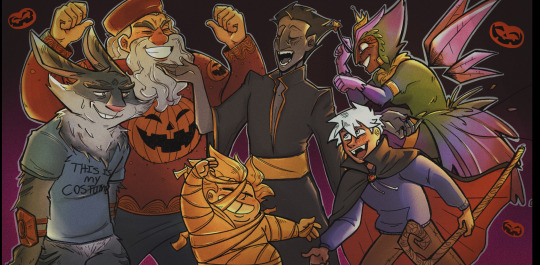

Artwork credits: 1] Concept art by Perry Maple, from the book THE ART OF RISE OF THE GUARDIANS; 2] "Guardians Dress Up!" by @purblzart; 3] Fabric swatch from @sylphidine's stash of holiday decorations, found at Ames Department Store in 1994.
RISE OF THE GUARDIANS HALLOWEEN 2024: Event Guidelines
13 days, 13 prompts.
Visual, aural, textile, and literary works are allowed - fanart, fanfiction, gifs, edits/manips, cosplay, fanmixes, crafts, or ask-and-answer.
Unlike other fandom events, reblogs of previously created material are welcome IF THEY FIT THE PROMPT, but creation of original material is preferred.
Inspiration can be drawn from the GUARDIANS OF CHILDHOOD bookverse, the RISE OF THE GUARDIANS movieverse, and any and all associated AUs.
OCs are welcome and encouraged to interact with RotG/GoC characters.
Crossovers are welcome, but please make sure that the focus POV is a character from RotG/GoC.
Works in progress are welcome and encouraged, as long as they fit the prompt. No reason not to celebrate Halloween all year ‘round! No need to worry about having to have something complete before posting.
Don’t feel like you ***must*** post a piece Every… Single… DAY, and/or fill every single prompt. Burnout is not fun. But do try to post at least ONE piece during the 13 days of the challenge.
Be sure to tag your works with @rotg-halloween, and list #rotghalloween in one of your first 5 tags.
Please tag works accordingly, and be sure to use any warnings for sensitive and potentially triggering subjects.
HAVE FUN, and support your fellow creators.
RISE OF THE GUARDIANS HALLOWEEN 2024: Prompts
19 October 2024 / Day One: Creak
20 October 2024 / Day Two: Darkness
21 October 2024/ Day Three: Cabin
22 October 2024 / Day Four: Castle
23 October 2024 / Day Five: Apparition
24 October 2024 / Day Six: Dystopia
25 October 2024 / Day Seven: Howl
26 October 2024 / Day Eight: Talisman
27 October 2024/ Day Nine: Changeling
28 October 2024 / Day Ten: Slasher
29 October 2024 / Day Eleven: Transmogrify
30 October 2024 / Day Twelve: Orbit
31 October 2024 / Day Thirteen: Slither
121 notes
·
View notes
Text
Anarky Reading Order
This is, based of my research the complete reading list in release order for all Anarly Comics as of October 1st 2024. Release dates were used when available but compromises were made with cover date when necessary. If you see anything that is wrong or needs new additions feel free to let me know!
(Comic Vine was a massive help in this Project!)
1. Detective Comics #608 November 1989
2. Detective Comics #609 December 1989
3. Detective Comics #620 August 1990
4. Batman #456 September 18th 1990
5. Detective Comics #627 March 1991
6. Batman Annual #15 April 18th 1991
7. Robin Annual #1 July 23rd 1992
8. Superman & Batman Magazine #1 Q3 1993
9. Batman: Shadow of the Bat #16
10. September 1993
11. Batman: Shadow of the Bat #17 September 1993
12. Batman: Shadow of the Bat #18 October 1993
13. Green Arrow #89 August 1994
14. Batman: Shadow of the Bat Annual #2 September 1994
15. The Batman Adventures #31 April 1995
16. Batman: Shadow of the Bat #40 May 16th 1995
17. The Batman Chronicles #1 May 30th 1995
18. The Batman Adventures #36 October 1st 1995
19. Batman: Shadow of the Bat #41 June 20th 1996
20. Batman: Shadow of the Bat #50 May 1st 1996
21. Batman: Shadow of the Bat #66 September 1st 1997
22. Batman: Shadow of the Bat #67 October 1st 1997
23. Batman: Shadow of the Bat #73 April 1998
24. DCU Heroes Secret Files February 1999
25. Anarky #1 May 1999
26. Anarky #2 June 1999
27. Anarky #3 July 1999
28. Anarky #4 August 1999
29. Anarky #5 September 1999
30. Anarky #6 October 1999
31. Anarky #7 November 1999
32. Anarky #8 December 1999
33. Sins of Youth: JLA, Jr. May 2000
34. Young Justice: Sins of Youth #1 May 2000
35. Young Justice: Sins of Youth #2 May 2000
36. Green Arrow #51 August 2005
37. Robin #181 December 17th 2008
38. Robin #182 January 21st 2009
39. Robin #183 April 1st 2009
40. Red Robin #3 August 12th 2009
41. Red Robin #13 June 3rd 2010
42. Red Robin #15 August 4th 2010
43. Red Robin #16 September 9th 2010
44. Red Robin #17 November 10th 2010
45. Red Robin #18 December 8th 2010
46. Red Robin #19 January 12th 2011
47. Red Robin #20 February 9th 2011
48. Red Robin #21 March 16th 2011
49. Red Robin #22 April 13th 2011
50. Red Robin #23 May 11th 2011
51. Red Robin #24 June 8th 2011
52. Beware the Batman #1 October 23rd 2013
53. Green Lantern Corps #25 November 13th 2013
54. Detective Comics #38 Janurary 7th 2015
55. Detective Comics #39 February 4th 2015
56. Detective Comics #40 March 4th 2015
57. Detective Comics: Endgame March 11th 2015
58. Detective Comics #957 May 24th 2017
59. Detective Comics #963 August 23rd 2017
60. Detective Comics #964 September 13th 2017
61. Detective Comics #966 October 11th 2017
62. Detective Comics #968 November 22nd 2017
63. Detective Comics #970 December 13th 2017
64. Detective Comics #971 December 27th 2017
65. Detective Comics #972 January 10th 2018
66. Detective Comics #973 January 24th 2018
67. Batman: Prelude to the Wedding: Red Hood vs. Anarky June 20th 2018
68. Harley Quinn #61 May 1st 2019
69. Harley Quinn #62 June 5th 2019
70. The Imfected: The Commissioner December 18th 2019
71. DC Nation Presents DC Future State November 24th 2020
72. Future State: The Next Batman #1 Janurary 5th 2021
73. I Am Batman #1 September 14th 2021
74. I Am Batman #2 October 12th 2021
75. Robins #4 February 15th 2022
76. Detective Comics #1054 February 22nd 2022
77. Batman: Urban Legends #22 December 20th 2022

63 notes
·
View notes
Text
Jeff Buckley 1994-10-28 Trinity Center Toronto Canada
May 17, 2022
Well, I'm finally getting around to digitizing my 700+ cassettes (at my wife's insistence--she wants them out of the house), so I'm going to start posting some goodies here. I taped many a show in the Toronto area from the late '80's to the late '90's, and also recorded a lot of radio broadcasts, mostly from CFNY, 102.1 in Toronto. Hope you stumble across something you like, or even a show you were at!
Jeff Buckley--Trinity Centre, Toronto, Canada, Oct. 28, 1994.
If you never got to see Jeff Buckley live, I'm sorry. You missed out. I was lucky enough to catch him twice, but the second time my tape deck was confiscated at the door. If anyone has his show at the Danforth where he played with Juliana Hatfield, I would be extremely greatful.
This night was amazing. The Trinity Centre is actually a church, the same one where the Cowboy Junkies recorded the Trinity Sessions. Unfortunately, we arrived a bit late, and ended up sitting near the back of the balcony, which didn't make for the best recording position. This is not the best tape in the world, but it was more listenable than I remembered it being. There is just a lot of hiss during the quiet bits. If hiss drives you batty, you may want to skip this, but if you can live with it, it's a very fine show. I was lucky enough to chat with Jeff briefly after the show, and he signed my copy of "Grace". I have included a scan of that in the torrent, as it is one of my prized possessions.
Lineage: Master>M Audio sound card>wav>flac. Song separation and gap editing with CDWave.
Set List:
01. Mojo Pin 02. So Real 03. Last Goodbye 04. What Will You Say 05. Dream Brother 06. Grace 07. Eternal Life 08. Lover, You Should Have Come Over 09. encore break 10. stage patter 11. Kangaroo
I just about died when he broke into the last song. Totally unexpected.
by Plumdusty





youtube
This is a video excerpt from the documentary, Amazing Grace: Jeff Buckley (2004): https://youtu.be/cTEpntWmg_o?t
The footage is taken from a concert at Trinity Church in Toronto, Ontario, Canada on 28 October 1994.
Thanks Steven!
7 notes
·
View notes
Text
October Movies Watchlist

Cozy Autumn Vibes
When Harry Met Sally (1989)
You've Got Mail (1998)
Mona Lisa Smile (2003)
Good Will Hunting (1997)
Clue (1985)
The Good Witch (1999)
Autumn in New York (2000)
Legends of the Fall (1994)
Dead Poets Society (1989)
October Sky (1999)
Big Fish (2003)
The Lake House (2006)
Rip in Time (2022)
Little Women (2019)
Knives Out (2019)
Anne of Green Gables (1985)
Cider House Rules (1999)
Remember the Titans (2000)

Nostalgic & Kid-Friendly:
The Halloween Tree (1993)
Matilda (1996)
The Iron Giant (1999)
Halloweentown (1998)
Halloweentown II: Kalabar's Revenge (2001)
Halloweentown High (2004)
Return to Halloweentown (2006)
James and the Giant Peach (1996)
The Nightmare Before Christmas (1993)
Monsters, Inc. (2001)
Monsters University (2013)
Pooh's Heffalump Halloween Movie (2005)
Fantastic Mr. Fox (2009)
Pagemaster (1994)
Into the Woods (2014)
Howl's Moving Castle (2004)
Don't Look Under the Bed (1999)
Spirited Away (2001)
Mary and the Witch's Flower (2017)
The Corpse Bride (2005)
A Monster in Paris (2011)
The Adventures of Ichabod and Mr. Toad (1949)
Puss in Boots: The Last Wish (2022)
Guillermo del Toro's Pinocchio (2022)
Coraline (2009)
Bedknobs and Broomsticks (1971)
The Karate Kid (1984)
The Last Unicorn (1982)
Jumanji (1995)
Earnest Scared Stupid (1991)
Hotel Transylvania (2012)
Hotel Transylvania 2 (2015)
Hotel Transylvania 3: Summer Vacation (2018)
Hotel Transylvania: Transformania (2022)
Edward Scissorhands (1990)
Twitches (2005)
Twitches Two (2007)
Wallace & Gromit: The Curse of the Were-Rabbit (2005)
Little Monsters (1989)
The Witches (1990 or 2020 remake)
Labyrinth (1986)
The Gate (1987)
Scary Stories to Tell in the Dark (2019)
Mom's got a Date with a Vampire (2000)
The House with a Clock in Its Walls (2018)
The Little Vampire (2000)
Haunted Mansion (2003)
Muppets Haunted Mansion (2021)
The Dark Crystal (1982)
Beetlejuice (1988)
Beetlejuice Beetlejuice (2024)
Five Nights at Freddy's (2023)
It's The Great Pumpkin, Charlie Brown (1966)
Hocus Pocus (1993)
The Addams Family (1991)
The Addams Family Values (1993)
The Addams Family (2019)
The Addams Family 2 (2021)
ET (1982)
Return to Oz (1985)
Paranorman (2012)
Monster House (2006)
Toy Story of Terror! (2013)
The Scream Team (2002)
Double, Double Toil and Trouble (1993)
The Secret of NIMH (1982)
Ghostbusters (1984)
Ghostbusters II (1989)
Ghostbusters (2016)
Ghostbusters: Afterlife (2021)
Ghostbusters: Frozen Empire (2024)
Wolfwalkers (2020)
The Secret of Kells (2009)
Song of the Sea (2014)
Goosebumps (2023)
Goosebumps 2 (2018)
The Goonies (1985)
Casper (1995)
Disney's Tower of Terror (1997)
Alvin and the Chipmunks Meet the Wolfman (2000)
Mad Monster Party (1967)
Wendell & Wild (2022)
Under Wraps (1997)
Under Wraps (2021)
Phantom of the Megaplex (2000)
Scooby Doo and the Ghoul School (1988)
Scooby Doo and the Reluctant Werewolf (1988)
Scooby Doo on Zombie Island (1998)
Scooby Doo and the Witch's Ghost (1999)
Scooby Doo and the Alien Invaders (2000)
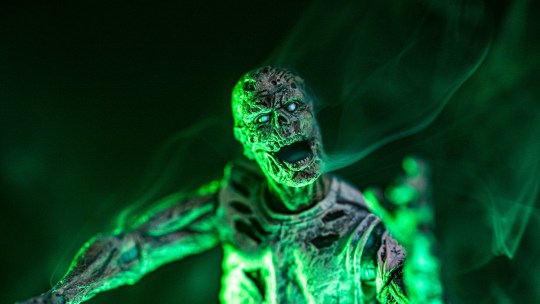
Zombies
Zombieland (2009)
Zombieland: Double Tap (2019)
Autumn (2014)
The Wailing (2016)
The Night Eats the World (2018)
The Dead Don’t Die (2019)
Scouts Guide to the Zombie Apocalypse (2015)
City of the Living Dead (1980)
The Beyond (1981)
The House by the Cemetery (1981)
Rec (2007)
Rec 2 (2009)
Quarantine (2008)
Quarantine 2: The Terminal (2011)
28 Days Later (2002)
28 Weeks Later (2007)
Train to Busan (2016)
Seoul Station (2016)
Cemetery Man (1994)
World War Z (2013)
Night of the Living Dead (1968)
Return of the Living Dead (1985)
Dawn of the Dead (2004)
Shawn of the Dead (2004)
Zombi (1978)
Zombi 2 (1979)
Zombi 3 (1988)
The Plague of the Zombies (1966)
Resident Evil (2002)
Resident Evil: Apocalypse (2004)
Resident Evil: Extinction (2007)
Resident Evil: Afterlife (2010)
Resident Evil: Retribution (2012)
Resident Evil: The Final Chapter (2017)
Resident Evil: Welcome to Raccoon City (2021)

Vampires & Werewolves
Dracula (1931)
Dracula's Daughter (1936)
Horror of Dracula (1958)
The Brides of Dracula (1960)
Dracula: Prince of Darkness (1966)
The Empire of Dracula (1967)
Dracula Has Risen from the Grave (1968)
Taste the Blood of Dracula (1970)
Count Dracula (1970)
Dracula A.D. 1972 (1972)
The Satanic Rites of Dracula (1973)
Scars of Dracula (1970)
Bram Stoker's Dracula (1992)
Van Helsing (2004)
Last Voyage of The Demeter (2023)
Renfield (2023)
Vampyr (1932)
Mark of the Vampire (1935)
Only Lovers Left Alive (2013)
The Vourdalak (2023)
A Girl Walks Home Alone at Night (2014)
What We Do in the Shadows (2014)
Interview With the Vampire (1994)
Queen of the Damned (2002)
Dark Shadows (2012)
Abigail (2024)
Blade (1998)
Blade II (2002)
Blade: Trinity (2004)
Vampire in Brooklyn (1995)
Fright Night (1985 or the 2011 remake)
The Last Man on Earth (1964)
I am Legend (2007)
Daybreakers (2009)
The Lost Boys (1987)
Salem's Lot (1979)
30 Days of Night (2007)
Underworld (2003)
Underworld: Evolution (2006)
Underworld: Rise of the Lycans (2009)
Underworld: Awakening (2012)
Underworld: Blood Wars (2016)
The Howling (1981)
Ginger Snaps (2000)
Werewolf of London (1935)
An American Werewolf in London (1981)
Silver Bullet (1985)
The Company of Wolves (1984)
Howl (2015)
Moon of the Wolf (1972)
Dog Soldiers (2002)
The Wolfman (1941)
The Curse of the Werewolf (1961)
The Wolfman (2010)

Slashers
Psycho (1960)
Candyman (1992 or 2021 remake)
Pearl (2022)
X (2022)
Child's Play (1988)
Child's Play 2 (1990)
Child's Play 3 (1991)
Bride of Chucky (1998)
Seed of Chucky (2004)
Curse of Chucky (2013)
Cult of Chucky (2017)
Scream (1996)
Scream (2022)
Happy Death Day (2017)
Happy Death Day 2U (2019)
Friday the 13th (1980)
Friday the 13th Part II (1981)
Friday the 13th Part III (1982)
Friday the 13th: The Final Chapter (1984)
Friday the 13th: A New Beginning (1985)
Friday the 13th Part VI: Jason Lives (1986)
Friday the 13th Part VII: The New Blood (1988)
Friday the 13th Part VIII: Jason Takes Manhattan (1989)
Jason Goes to Hell: The Final Friday (1993)
Jason X (2002)
Freddy vs. Jason (2003)
Friday the 13th (2009)
Children of the Corn (1987)
Halloween (1978)
Halloween II (1981)
Halloween III: Season of the Witch (1986)
Halloween 4: The Return of Michael Myers (1988)
Halloween 5: The Revenge of Michael Myers (1989)
Halloween: The Curse of Michael Myers (1995)
Halloween H20: 20 Years Later (1998)
Halloween Resurrection (2002)
Halloween (2007)
Halloween II (2009)
Halloween (2018)
Halloween Kills (2021)
Halloween Ends (2022)
Nightmare on Elm Street (1984)
A Nightmare on Elm Street 2: Freddy's Revenge (1985)
A Nightmare on Elm Street 3: Dream Warriors (1987)
A Nightmare on Elm Street 4: The Dream Master (1988)
A Nightmare on Elm Street 5: The Dream Child (1989)
Freddy's Dead: The Final Nightmare (1991)
Wes Craven's New Nightmare (1994)
A Nightmare on Elm Street (2010)
Black Pumpkin (2020)
Hauntedween (1991)
Dark Harvest (2023)
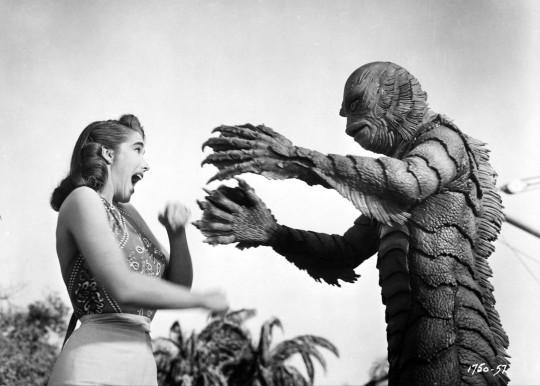
Monsters
The Invisible Man (1933)
The Mummy (1932)
The Mummy (1959)
The Mummy (1999)
Frankenstein (1931)
Bride of Frankenstein (1935)
Son of Frankenstein (1939)
The Curse of Frankenstein (1957)
Creature From the Black Lagoon (1954)
The Monster Club (1981)
The Monster Squad (1987)
Hellboy (2004)
Hellboy II: The Golden Army (2008)
Hellboy (2019)
The Gorgon (1964)
Gremlins (1984)
Gremlins 2: The New Batch (1990)
Little Shop of Horrors (1986)
Pumpkinhead (1988)
Pumpkinhead II: Blood Wings (1994)
Pumpkinhead: Ashes to Ashes (2006)
Pumpkinhead: Blood Feud (2007)
Cloverfield (2008)
Jurassic Park (1993)
Jeepers Creepers (2001)
Jeepers Creepers 2 (2003)
Jeepers Creepers 3 (2017)
Jeepers Creepers: Reborn (2022)
Don't Be Afraid of the Dark (1973 or 2010 remake)
Tremors (1990)
Tremors 2: Aftershocks (1996)
Tremors 3: Back to Perfection (2001)
The Mist (2007)
The Descent (2005)
The Descent Part 2 (2009)
Bird Box (2018)

Aliens
The War of the Worlds (1953)
War of the Worlds (2005)
Annihilation (2018)
Invasion of the Body Snatchers (1956)
Invasion of the Body Snatchers (1978)
Slither (2006)
Forbidden Planet (1956)
Signs (2002)
Mars Attacks (1996)
Evolution (2001)
Color Out of Space (2019)
Cowboys & Aliens (2011)
Paul (2011)
A Quiet Place (2018)
A Quiet Place: Part 2 (2020)
The Faculty (1998)
Prey (2022)
Predator (1987)
Predator 2 (1990)
Alien vs. Predator (2004)
Aliens vs. Predator: Requiem (2007)
The Predator (2018)
Predators (2010)
Alien (1979)
Aliens (1986)
Alien 3 (1992)
Alien: Resurrection (1997)
Prometheus (2012)
Alien: Covenant (2017)
Alien: Romulus (2024)
Nope (2022)
Apollo 18 (2011)
Dreamcatcher (2003)
The Thing From Another World (1951)
The Thing (1982 or 2011 remake)
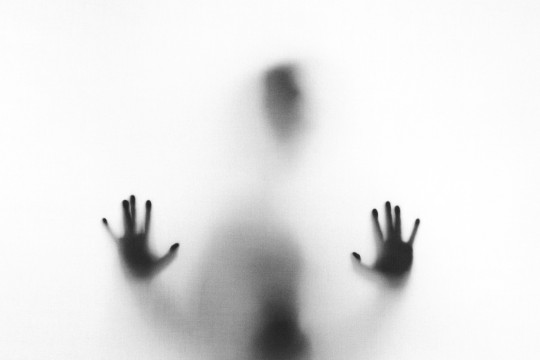
Evil & Hauntings
Annabelle (2014)
Annabelle: Creation (2017)
Annabelle Comes Home (2019)
Sleepy Hollow (1999)
The Curse of La Llorona (2019)
Ghost (1990)
Ghostwatch (1992)
The Uninvited (1944)
Hellraiser (1987)
Spawn (1997)
WNUF Halloween Special (2013)
The Lady in White (1988)
The Deep House (2021)
Ready or Not (2019)
The Woman in Black (2012)
The Woman in Black: Angel of Death (2014)
The Haunting (1963)
Ouija (2014)
Ouija: Origin of Evil (2016)
The Others (2001)
La Llarona (1960)
Gothika (2003)
Poltergeist (1982)
Poltergeist II: The Other Side (1986)
Poltergeist (2015)
The Shining (1980)
Doctor Sleep (2019)
The Brothers Grimm (2005)
The Conjuring (2013)
The Conjuring: The Devil Made Me Do It (2021)
The Conjuring 2 (2016)
The Exorcist (1973)
Constantine (2005)
The Frighteners (1996)
1408 (2007)
Mama (2013)
Crimson Peak (2015)
The Grudge (2004 or the 2020 remake—OR, Ju-on, the og Japanese 2002 version)
The Sixth Sense (1999)
The Devil's Backbone (2001)
The Evil Dead (1981)
The Evil Dead 2 (1997)
Army of Darkness (1992)
The Evil Dead (2013)
The Evil Dead Rise (2023)
Skinamarink (2022)
Kill Baby Kill (1966)
Burnt Offerings (1973)
The Tomb of Ligeia (1964)
As Above, So Below (2014)
A Haunting in Connecticut (2009)
Shutter (2008)
The Mist (2008)
Pulse (2001)
The Eye (2008)
Ringu (1998)
The Ring (2002)
The Ring Two (2005)
Sinister (2012)
Insidious (2010)
Insidious: Chapter 2 (2013)
Insidious: The Last Key (2018)
Insidious: The Red Door (2023)
Grave Encounters (2011)
Grave Encounters 2 (2012)
Paranormal Activity (2007)
Paranormal Activity 2 (2010)
Paranormal Activity 3 (2011)
Paranormal Activity 4 (2012)
Paranormal Activity: The Ghost Dimension (2015)
Paranormal Activity: Next of Kin (2021)
Aterrados (In English: Terrified) (2018)
The Ghost and Mrs. Muir (1947)
High Spirits (1988)
Veronica (2017)
The Omen (1976)
The Omen 2 (1978)
The Omen (2006)
The First Omen (2024)
Thirteen Ghosts (2001)
The Babadook (2014)
Phantasm (1979)
Phantasm II (1988)
Phantasm III: Lord of the Dead (1994)
Phantasm IV: Oblivion (1998)
Phantasm V: RaVager (2016)
Devil Dog (1978)
Jennifer's Body (2009)
Lights Out (2016)
Kwaidon (1964)
Ghost Ship (2002)
House on Haunted Hill (1959)
The Devil Rides Out (1968)
Tales from the Crypt: Demon Knight (1995)
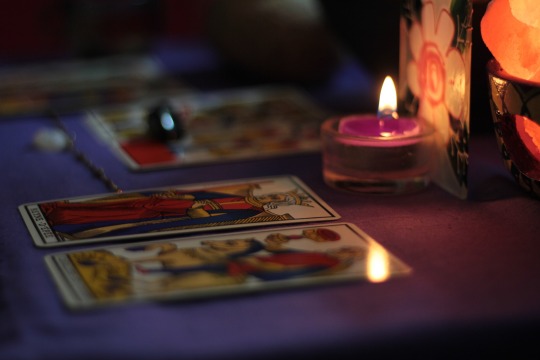
Witches & Magic
Pan's Labyrinth (2006)
The Witches of Eastwick (1987)
Practical Magic (1998)
The Witch (2015)
The Blair Witch Project (1999)
Book of Shadows: Blair Witch 2 (2000)
Blair Witch (2016)
The Wicker Man (1973)
The Wicker Man (2006)
The City of the Dead (1960)
Bell Book and Candle (1958)
The Witches (1990 or 2020 remake)
Black Sunday (1960)
El Espejo de la Bruja (In English: The Witch's Mirror) (1960)
I Married a Witch (1942)
The Craft (1996)
Apostle (2018)
The Love Witch (2016)
Burn Witch Burn (1962)

Horror
Creepshow (1982)
Creepshow 2 (1987)
November (2017)
The Pit and the Pendulum (1961)
Sweeney Todd: The Demon Barber of Fleet Street (2007)
Trick r Treat (2007)
Bad Candy (2020)
The Barn (2016)
The Barn: Part II (2022)
Tales of Halloween (2015)
Willy's Wonderland (2021)
Eyes Without a Face (1960)
Frankenstein Created Woman (1967)
Valerie and Her Week of Wonders (1970)
The Midnight Hour (1985)
The Curse of Bridge Hollow (2022)
The Birds (1963)
Cape Fear (1960)
Horns (2013)
M3GAN (2022)
The Phantom of the Opera (1925)
The Phantom of the Opera (1943)
The Phantom of the Opera (1962)
The Phantom of the Opera (2004)
Viy (1967)
Haunt (2019)
Diabolique (1955)
The X-Files: I Want to Believe (2008)
Rosemary's Baby (1968)
The Lodge (2019)
The Mask of the Red Death (1964)
The Premature Burial (1962)
Dark Night of the Scarecrow (1981)
Dark Night of the Scarecrow 2 (2022)
Buried Alive (1990)
Midsommar (2018)
Island of Lost Souls (1932)
Honeymoon (2014)
Session 9 (2001)
The Blood of Satan's Claw (1971)
Black Death (2010)
Something Wicked This Way Comes (1983)
Pet Sematary (1989 or the 2019 remake)
It (1990)
It: Chapter One (2017)
It: Chapter Two (2019)
Hereditary (2018)
Tales from the Darkside: The Movie (1990)
Re-Animator (1985)
Bride of Re-Animator (1990)
Beyond Re-Animator (2003)
Lisa Frankenstein (2024)
V/H/S (2012)
V/H/S/2 (2013)
V/H/S: Viral (2014)
V/H/S/94 (2021)
V/H/S/99 (2022)
V/H/S/85 (2023)
V/H/S/Beyond (2024)
Eyes of Fire (1983)
The Red House (1947)
Deadly Blessing (1981)
Dark Water (2002 or 2005 remake)
The Substance (2024)
Thinner (1996)
Cobweb (2023)
The Happening (2008)
Mystery of the Wax Museum (1933)
House of Wax (1953)
House of Wax (2005)
Dr. Jekyll and Mr. Hyde (1931)
The Devil-Doll (1936)
The Man They Could Not Hang (1939)
Black Sabbath (1963)
Cabin in the Woods (2011)
The Ruins (2008)
Summer of Fear (1978)
Fear Street: Part One, Two & Three (2021)
The Ritual (2017)
Dr. Terror's House of Horrors (1965)
The Black Cat (1934)
Teeth (2007)
Late Night with the Devil (2023)
I Saw the TV Glow (2024)
Freaks (1932)
The Old Dark House (1932)
Mr. Sardonicus (1961)
I Bury the Living (1958)
Plague Dogs (1982)
Watership Down (1978)
Ringing Bell (In Japanese: Chirin No Suzu) (1978)
Felidae (1994)
Psychological
Lake Mungo (2008)
Shutter Island (2010)
The Dead Zone (1983)
Donnie Darko (2001)
Us (2019)The Village (2004)
Carnival of Souls (1962)
Carnival of Souls (1998)
Deus Ex Machina (2014)
The Lazarus Effect (2015)
It Follows (2014)
Get Out (2017)
Comedy/Satire
Arsenic and Old Lace (1944)
Young Frankenstein (1974)
Death Becomes Her (1992)
Hubie Halloween (2020)
Scary Movie (2000)
Scary Movie 2 (2001)
Scary Movie 3 (2003)
Scary Movie 4 (2006)
Scary Movie 5 (2013)
61 notes
·
View notes
Text
Buck-Tick in analogue Part I | 80s - 90s
A collection I've been making for a long time of organized BUCK-TICK polaroids and other analog photos with dates. Side projects may also be included.
Tried to track as much as I could find.
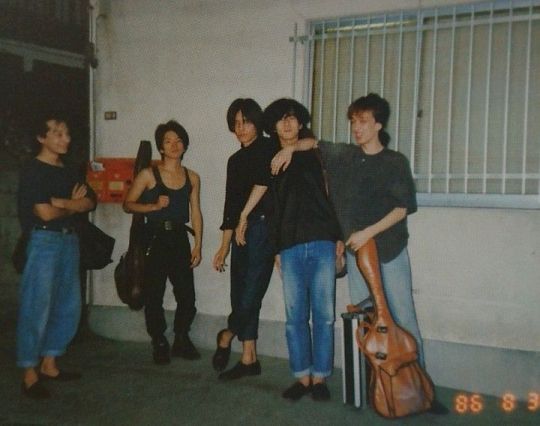
↑ 3 August - 1986

↑ 21 December - 1986 (Hidehiko Hoshino and the Buck-Tick van)

↑ 19 October - 1987 (Sakurai at age 21)

↑ 1988 (Sakurai at age 22)

↑ 2 June - 1988 (Imai and Hoshino)


↑ 20 January - 1989 (Sakurai one on the side)

↑ 28 September - 1991

↑ 3 October - 1993 (Imai and Sakurai)

↑ 17 February - 1994 (Sakurai at age 27)

↑ May 1994 (From Ongaku to Hito. Interview with Issay)

↑ 29 March - 1995 (Sakurai at age 29)

↑ 25 July - 1995
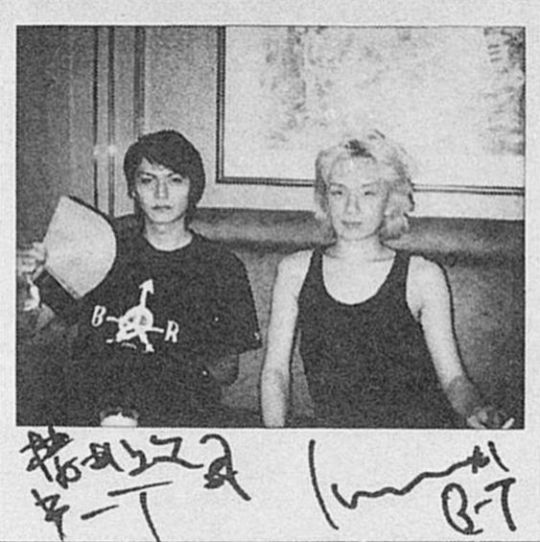
↑ 1996 (Sakurai and Imai. I'm unsure of the date but based on other pictures I found I gave it 96')

↑ July 1996 (From Ongaku to Hito)

↑ 27 September - 1997 (Sakurai)

↑ 1997 or 1998 (Imai and Sakurai, unsure about the date)
#buck tick#atsushi sakurai#hidehiko hoshino#hisashi imai#yutaka higuchi#toll yagami#polaroid#櫻井敦司#星野英彦#今井寿#樋口豊#ヤガミトール
293 notes
·
View notes
Text

The Year In Doom & Gloom
Doom & Gloom From The Tomb celebrated its 15th anniversary this year, which is crazy. But what can I say, I keep finding cool live tapes and keep feeling compelled to share them with you ... whoever you are! A lot of this website is just me talking to myself, hashing and rehashing and re-re-hashing various obsessions, getting impossibly niche about some of my favorite artists, trying to shine a light into the darkest corners of music history. But that makes it sound like it's a serious endeavor. Mostly, it's fun. I hope it's fun for you too. So, if you need to catch up, here's a tip-of-the-iceberg rundown of what we checked out over the last 12 months ... as always, thank a taper!
Lou Reed - Sister Ray in the 70s
“Candy Says” - Lou Reed, Kongress Zentrum, Hamburg, Germany, March 29, 1979
Lou Reed - October 1974
Lou Reed - Lady Mitchell Hall, Cambridge, England, October 13, 1972
Lou Reed - City Hall, Sheffield, England, June 1, 1974
Lou Reed - Konserthuset, Stockholm, Sweden, May 14, 1974
Lou Reed - Parc Des Expositions De Colmar, Theatre De Plein Air, Colmar, France, August 12, 2004
The Modern Lovers - Radcliffe College, Cambridge, Massachusetts, October 27, 1972
The Modern Lovers - Sword in the Stone, Boston, Massachusetts, 1972
The Modern Lovers - Boston Center for the Arts, Boston, Massachusetts, February 23, 1974
Foggy Notion - The Bowery Ballroom, New York City, December 13, 2023
The Feelies - Daniel Street, Milford, Connecticut, July 22, 2011
John Sinclair - BAR, New Haven, Connecticut, September 28, 2003
Meg Baird + Chris Forsyth, Cafe Nine, New Haven, Connecticut, October 26, 2022
John Fahey - McCabe’s Guitar Shop, Santa Monica, California, December 1979
The Go-Betweens - The Gatekeeper To Your Soul
Frank Black - Wetlands, New York City, June 13, 1994
Jacobites - Hearts Are Like Flowers
The Replacements - The Ritz, New York City, June 21, 1986
Willie Nelson - El Rey Theatre, Los Angeles, California, December 20, 1997
Neil Young - Razor Love (1984-2020)
Neil Young & Crazy Horse - Control The Violent Side
“Peace Of Mind” - Neil Young & Crazy Horse, Community Theater, Berkeley, California, November 2, 1976
Neil Young & Crazy Horse - Festival Hall, Osaka, Japan, March 4, 1976
Neil Young & Crazy Horse - Copps Coliseum, Hamilton, Ontario, October 31, 1996
Neil Young & Crazy Horse - Shoreline Amphitheatre, Mountain View, California, October 1 / October 2, 1994
Fairport Convention - Harlow Town Hall, Essex, England, June 15, 1974
Richard & Linda Thompson - Dublin Stadium, Dublin, Ireland, November 10, 1979
Robyn Hitchcock & Richard Thompson - “First Girl I Loved (Incredible String Band),” The Barbican, London, England, July 19, 2009
Can - Nordseeheilbad, Cuxhaven, Germany, January 7, 1976
Bob Dylan and The Band - “Nobody ‘Cept You” (Outtake)
Bob Dylan & The Band - Chicago Stadium, Chicago, Illinois, Jan. 3, 1974
Patti Smith - Max’s Kansas City, New York City, September 1, 1974
Patti Smith Group / John Cale / Television - The Palladium, New York City, December 31, 1976
Television - Great American Music Hall, San Francisco, California, December 9, 1992
Television - Roseland, New York City, October 2, 2004
Grant Lee Buffalo - Shepherd’s Bush Empire, London, England, October 11, 1994
Tom Petty & The Heartbreakers - Vredenburg, Utrecht, The Netherlands, December 4, 1982
Wilco - Orpheum Theatre, Boston, Massachusetts, October 19, 2002
#bootlegs#lou reed#neil young and crazy horse#television#patti smith#bob dylan#richard thompson#the modern lovers
31 notes
·
View notes
Text
Happy New Year!!
2024 will bring:
30 years of the original Stargate movie! (October 28, 1994)
27 years of Stargate SG-1! (July 27, 1997)
20 years of Stargate Atlantis! (July 16, 2004)
15 years of Stargate Universe! (October 2, 2009)
157 notes
·
View notes
Text
crowdsourcing something. do you have songs with dates in the title? I want all your songs with dates in the title.
I am looking for:
Calendar dates (such as "January 28th" or "1/28/1994" by the Bandnames)
Month names (such as "October" by the Bandnames)
Named holidays (such as "Labor Day" by the Bandnames)
https://forms.gle/YFnAuHUAkzxqwkHXA
38 notes
·
View notes